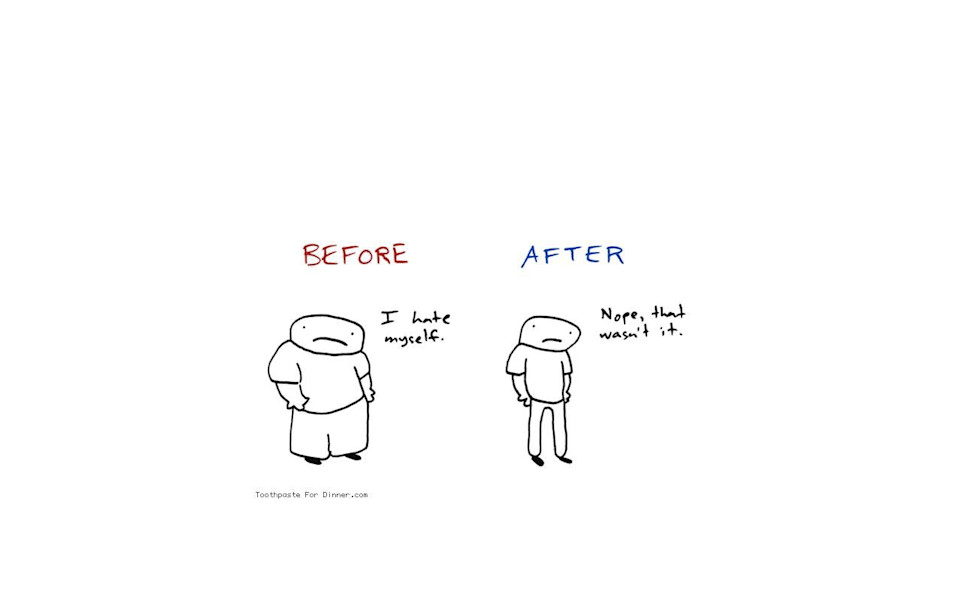Slides
Transcript
-
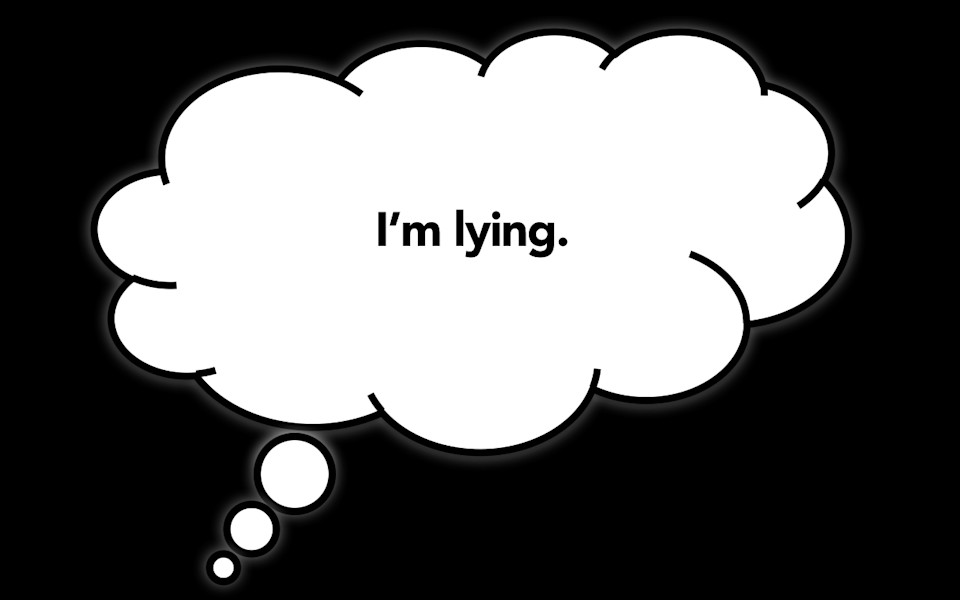
Hi, I’m Karen McGrane. And I’m better than you.
No, what are you laughing at me for? I’m the one standing on here on stage, right? Like, can’t you tell that makes me better than you? I mean, I wrote a hit play!
-
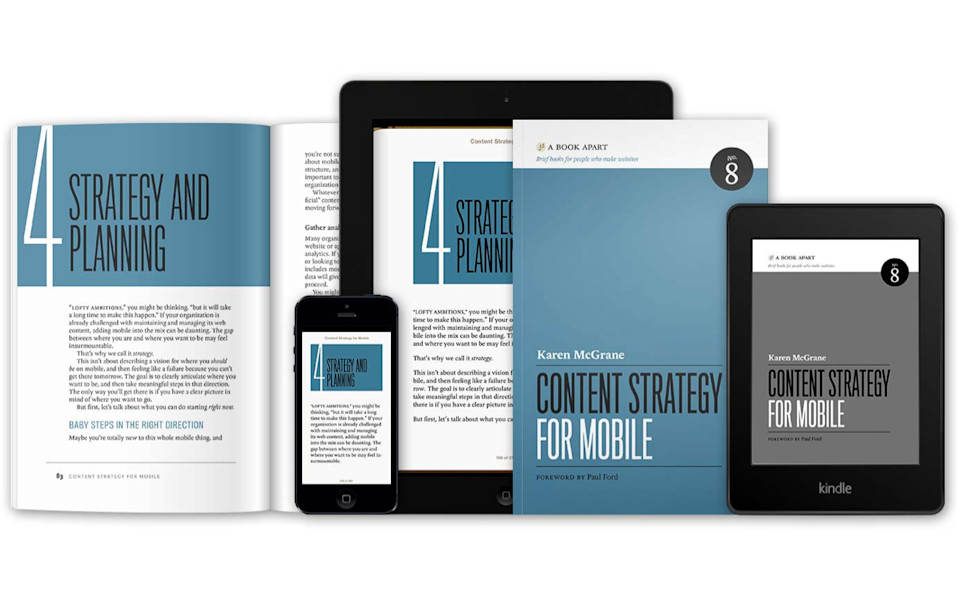
I had a fantastically successful book come out this year.
-
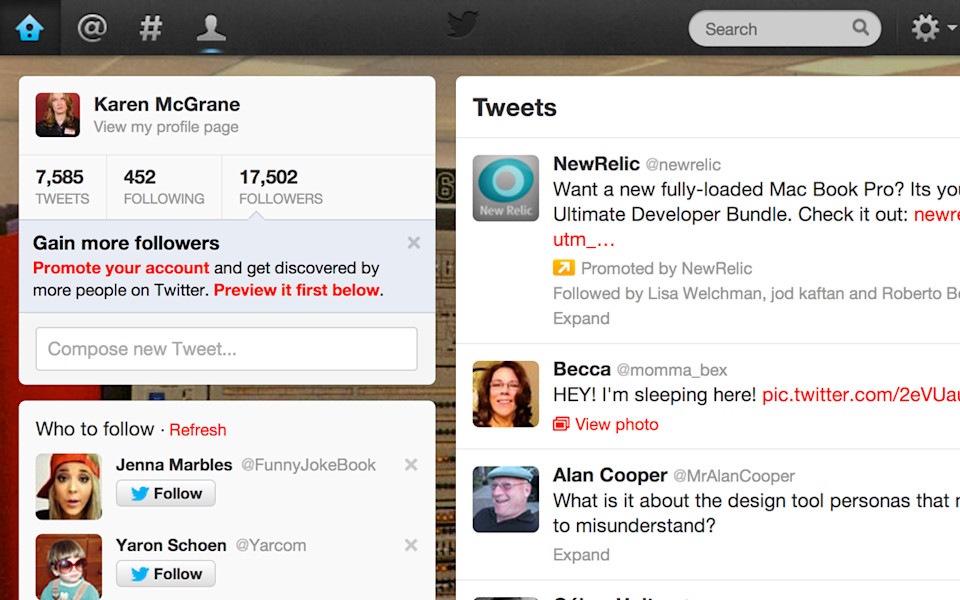
I have more Twitter followers than you do.
-
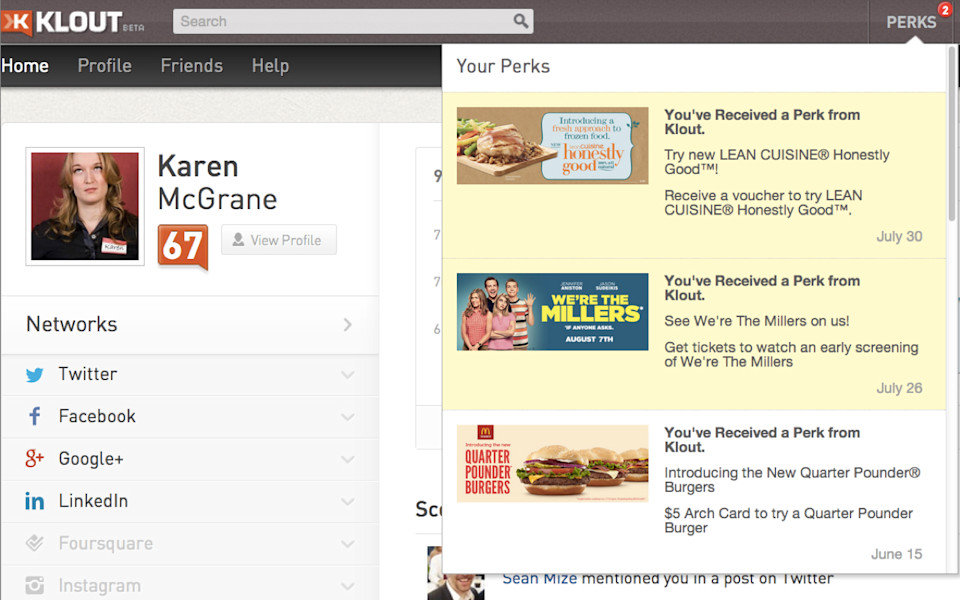
My enviable Klout score entitles me to fantastic perks on things like McDonald’s and Lean Cuisine.
-
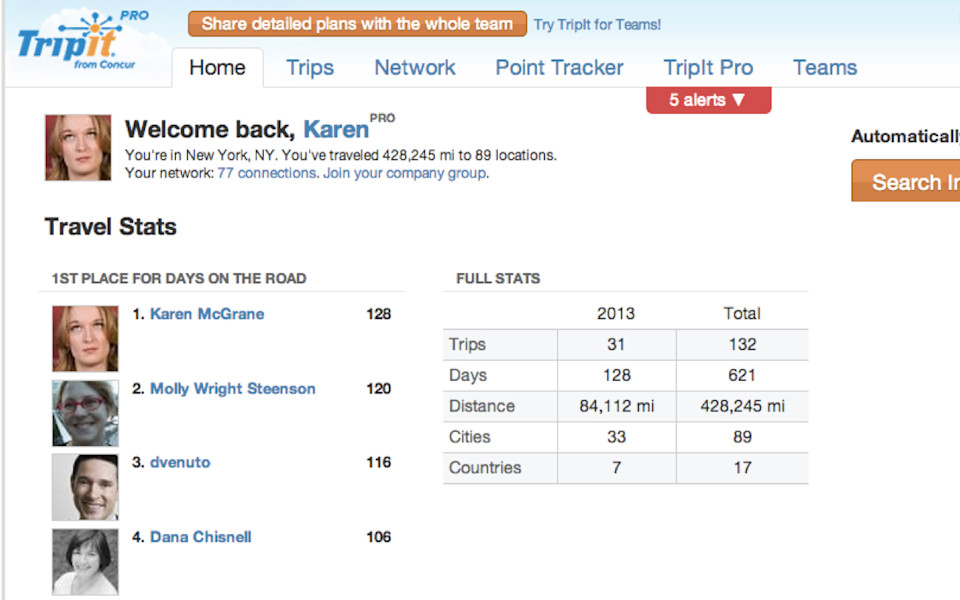
TripIt tells me that I am number one, I am in first place for number of days spent on the road this year. I am beating you in a competition that you didn’t even know you were playing!
-
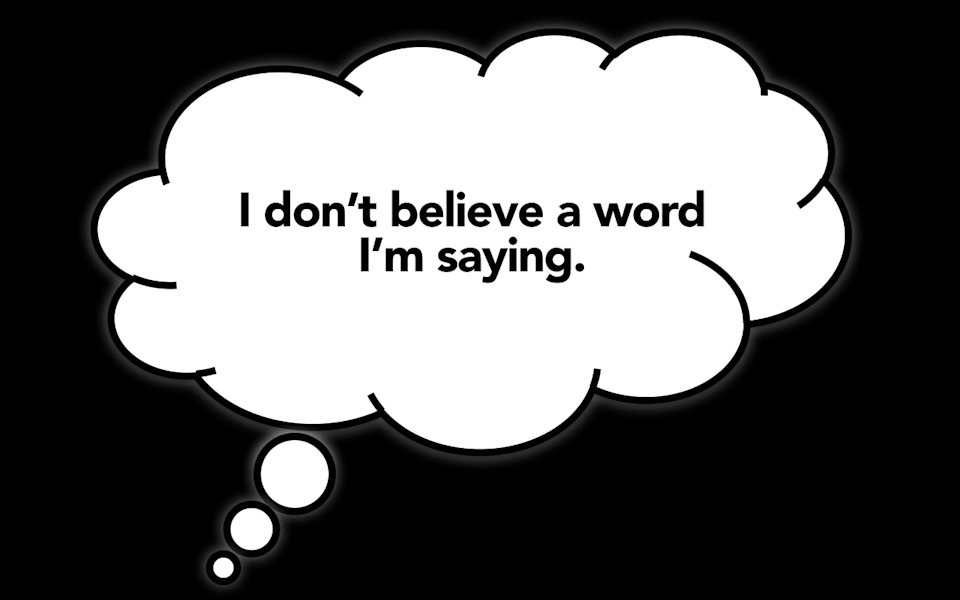
I think that all of these external measures of what it makes for a life well lived, I mean I think that this kind of stuff really is a marker of how I am better than you.
-
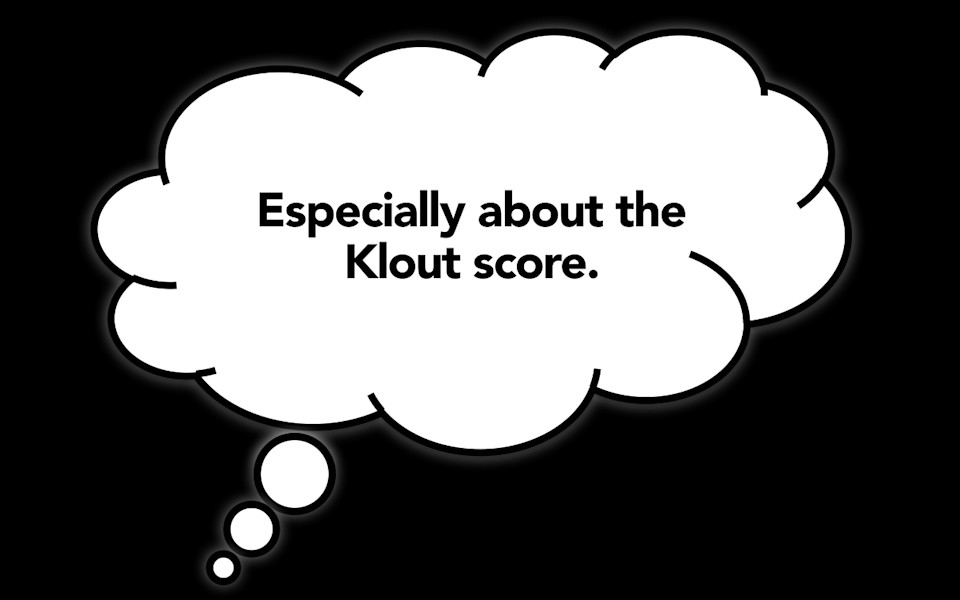
-
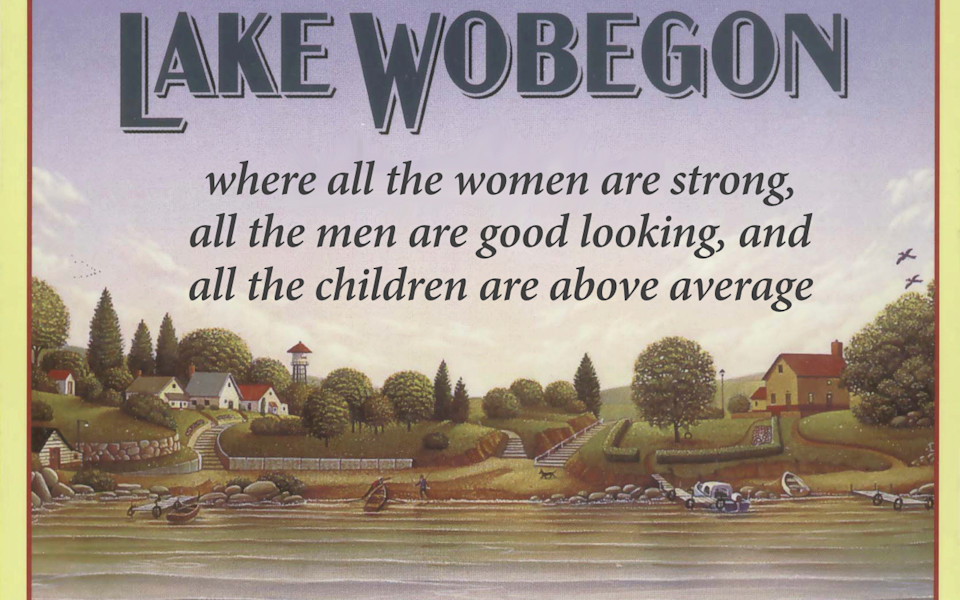
So where I come from, Minnesota, the author Garrison Keillor, he writes about the fictional town of Lake Woebegon. It’s a place where all the women are strong, all of the men are good looking and all of the children are above average. This term has actually been formed into a phrase called the Lake Woebegon Effect.
-
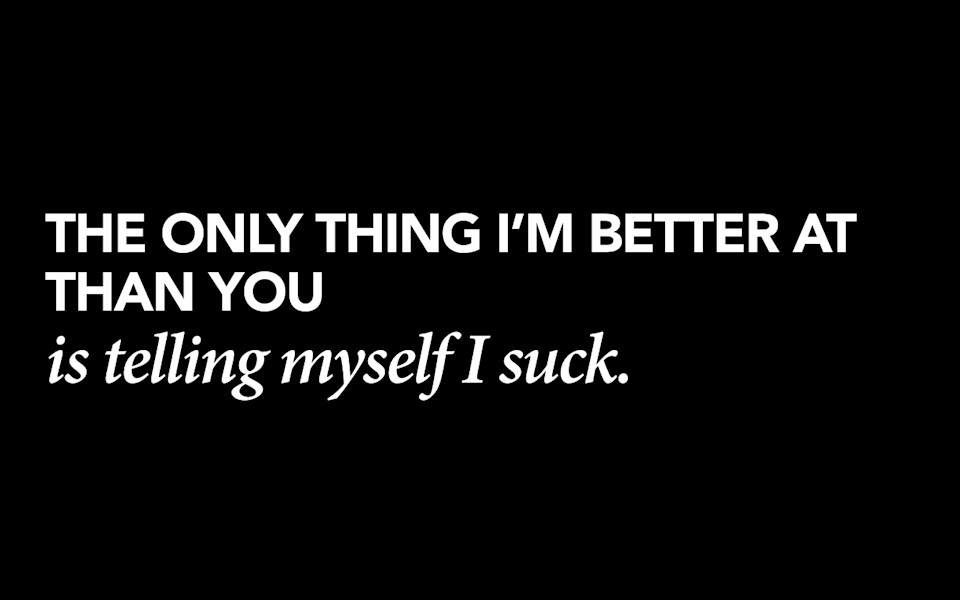
What it means is that we have this deep-seated need to believe that we are better than other people. We have this deep-seated need to assume that we are above average, that we are more talented, more qualified. That in order to deal with our own insecurities, we have to put ourselves above other people.
And, you know, I have to confess to you guys, like, I don’t really think I’m better than you. In fact, the only thing I’m actually better at than you is telling myself that I suck.
-

And at this I am fantastic, okay? I swear to god, this is like my finest skill in life, telling myself that I’m not good enough. And you might think, well, god, Karen, these skills that you have—having really deep-seated insecurities about whether or not you’re good enough, and then projecting that out onto other people by having to believe that you’re better than them and putting them down so that you feel better about yourself, like, what good are those skills going to do you in the modern world? And in fact, you might not think that this would qualify me for many jobs, but in fact, these skills are perfect if you want to get a job in consulting.
-

I genuinely believe that the ability to be anxious about your skills and desperately maintain this facade of perfection, meanwhile secretly questioning the merits of your continued existence—I mean, that’s client services in a nut shell. And, you know, this guy? Hates himself.
-
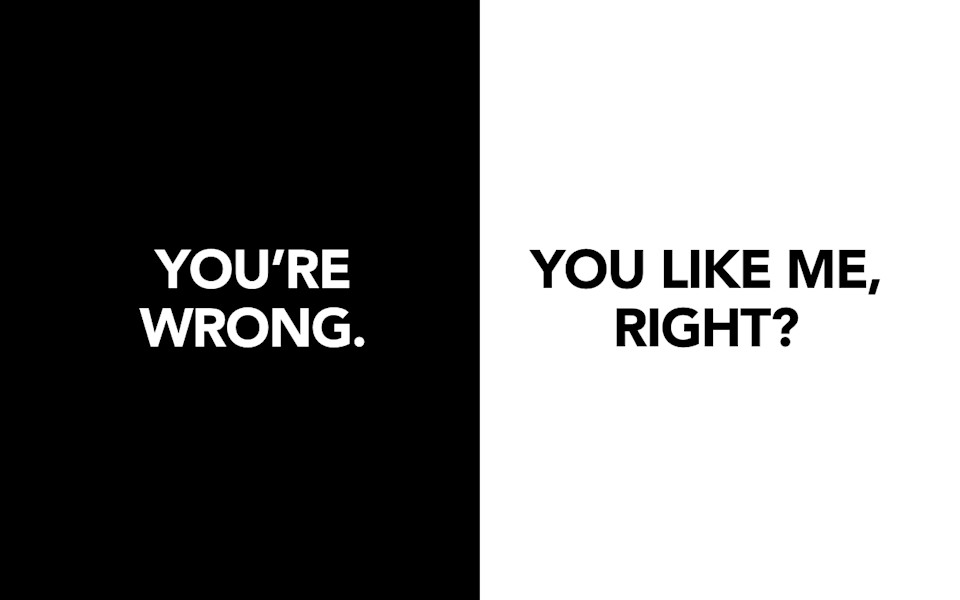
And so I think this is really sort of at the heart of the push-pull of client services where on the one hand we’re constantly having to go out into the world, particularly in the digital space and be like, “You’re wrong!” “You don’t know what you’re doing!” “Your ideas are bad” “You’re making mistakes.” “You shouldn’t do it this way!”
-
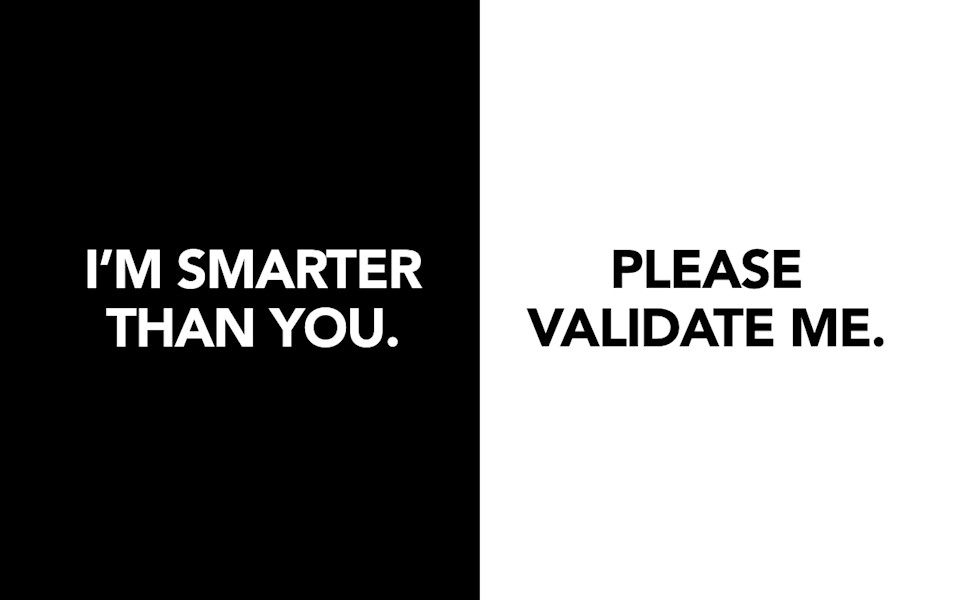
And at the same time it’s like, “But, you like me, right?” “You think my ideas are good, you want to believe me and trust me?” You have to go out into the world and be like, “But I’m smarter than you! I’m better than you! I have better ideas, my ideas are right and you have to listen to me.” But also, “I’m still desperately seeking validation from these people whose opinions I don’t really respect.”
-
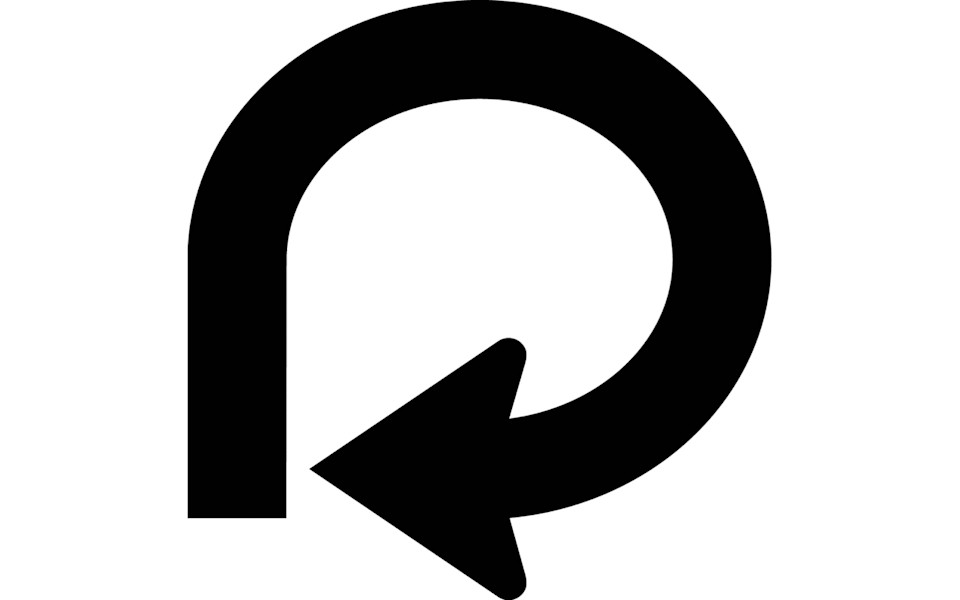
I call this The Loop.
So The Loop is where you only believe that you are worthy if you get it right. The Loop is where you only believe that your value to the world is that you have the right ideas. And the problem is that you can’t live with that insecurity in yourself. You can’t live by constantly judging yourself that way all the time. So you project it out on to other people. You’re kind of like, “oh god get this off of me, I can’t take this anymore!” I’m going to judge you and you’re not going to be good enough. I’m going to blame you and you’re doing it wrong. And so instead of judging yourself all the time you start judging other people. Instead of validating yourself you look for validation from other people.
-
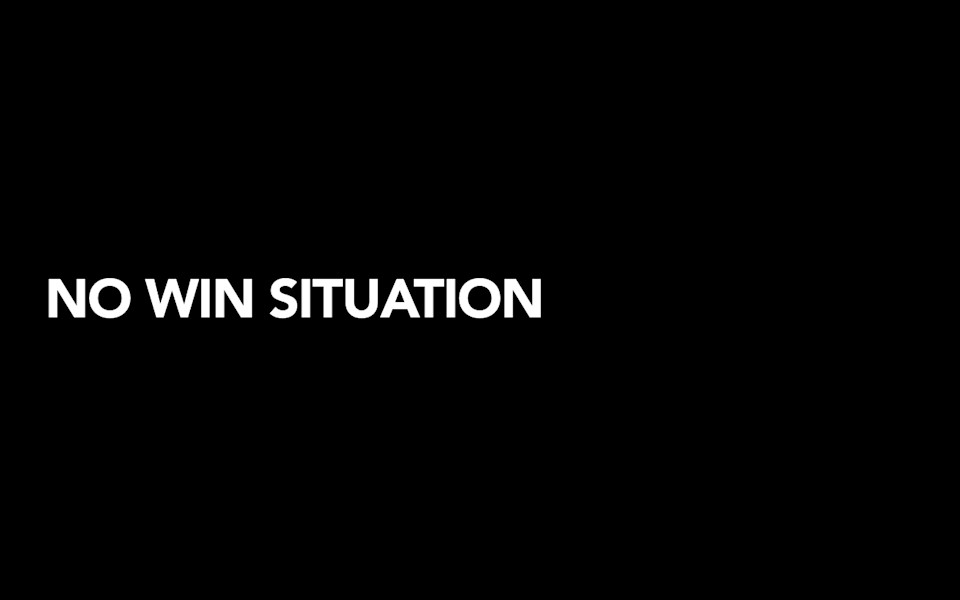
The problem with The Loop is that it always comes back to haunt you. It always comes back around. The Loop is a no win situation.
You will never be able to be right enough. You will never be able to get the validation from the external world that you need. And paradoxically, the only way out of The Loop is by going inside and instead realizing that the solution is by being kinder to yourself, is by having compassion for yourself in the same way that you would want to have compassion for other people.
-
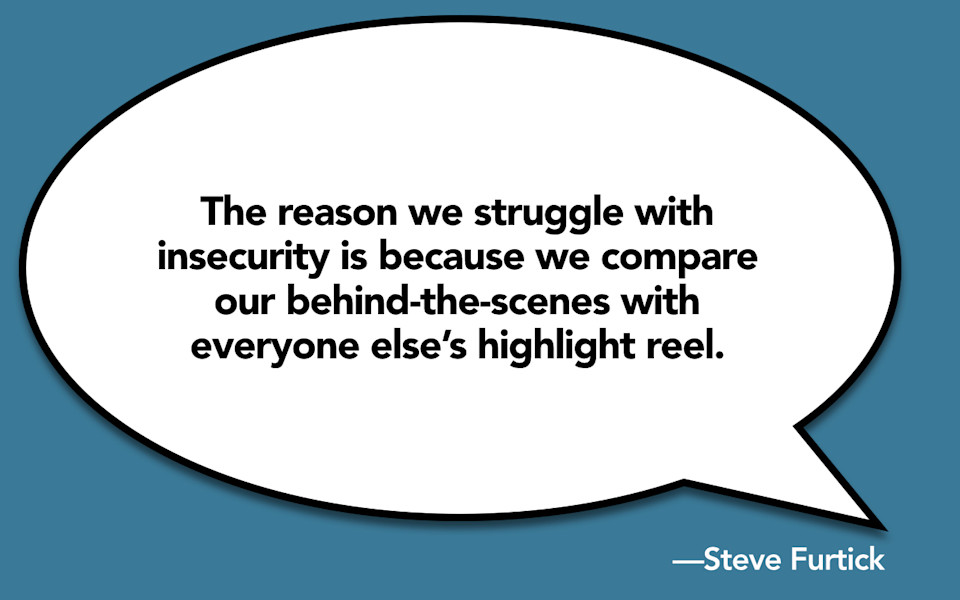
This is a really famous quote, I think that a lot of people who are active in social media have seen this. “The reason that we struggle with insecurity is because we compare our behind the scenes with everybody else’s highlights reel.”
And, you know, Facebook, Instagram, all of these social channels, it’s like we finally now have a broadcast medium for The Loop.
-
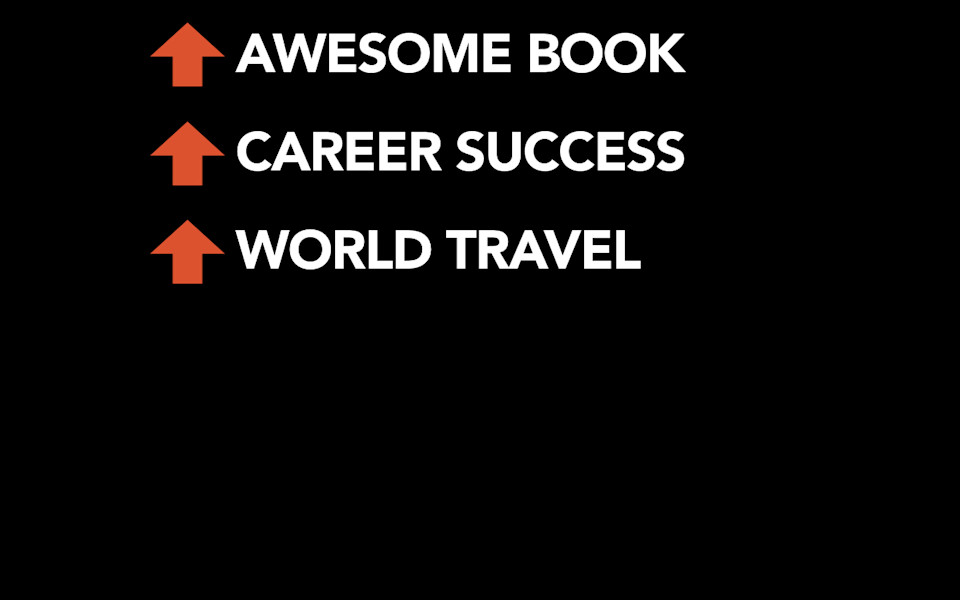
And I think if you were to look at my life over the last year, if you saw only my highlights reel, you would say, you’d be like, Wow. You know, I published an awesome book, it was very well received, people seemed to like it. My career has totally taken off as a result. I’m doing better work and more interesting work than before. I’ve travelled all over the world, I’ve gotten to meet amazing and interesting people and from the outside, my last year, it looked fantastic.
-
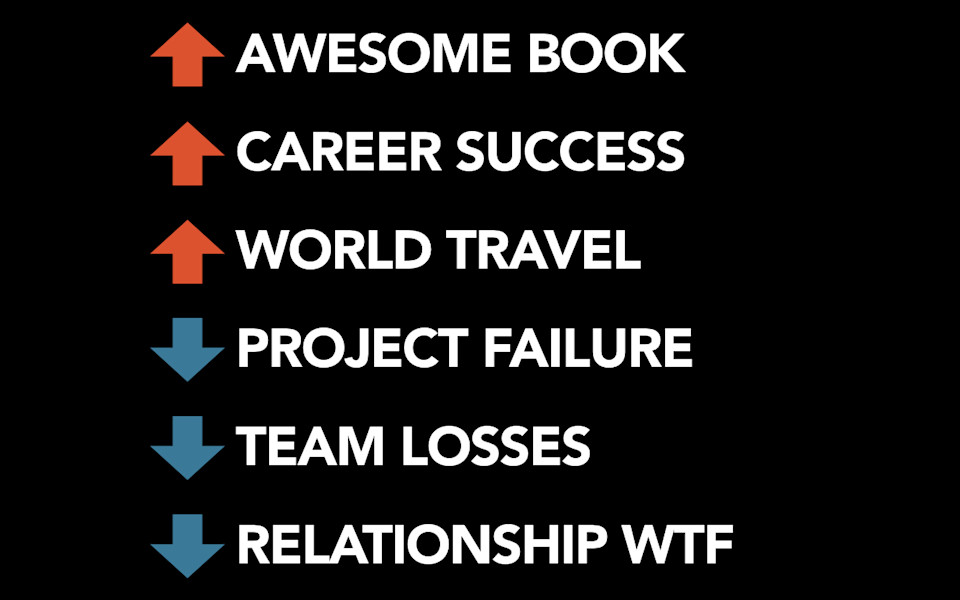
On the inside, though, I had some spectacular project failures. I had one two-week period where literally $500,000 of sure-thing business all evaporated like that. You know, these were projects that weren’t competitive, I had clients calling me up and saying yes, we love you, we want to work with you, money that I had counted on and it was just gone. And there was nothing I could do about it. I turned around and had to talk to the team of people that I had been working with literally for years and say, “Hey. I can’t do this anymore.” Like, I don’t have the work coming in to keep you busy. I actually don’t really even want to go on doing this. It’s like, I want to do something different with my life right now, and I ended my relationships with my team. Very amicably, but it was a hard loss for me to have to say I’m not going to be able to keep these people employed anymore. And in the middle of all of this I went through the kind of relationship disaster that I think would bring pretty much anybody to their knees.
-
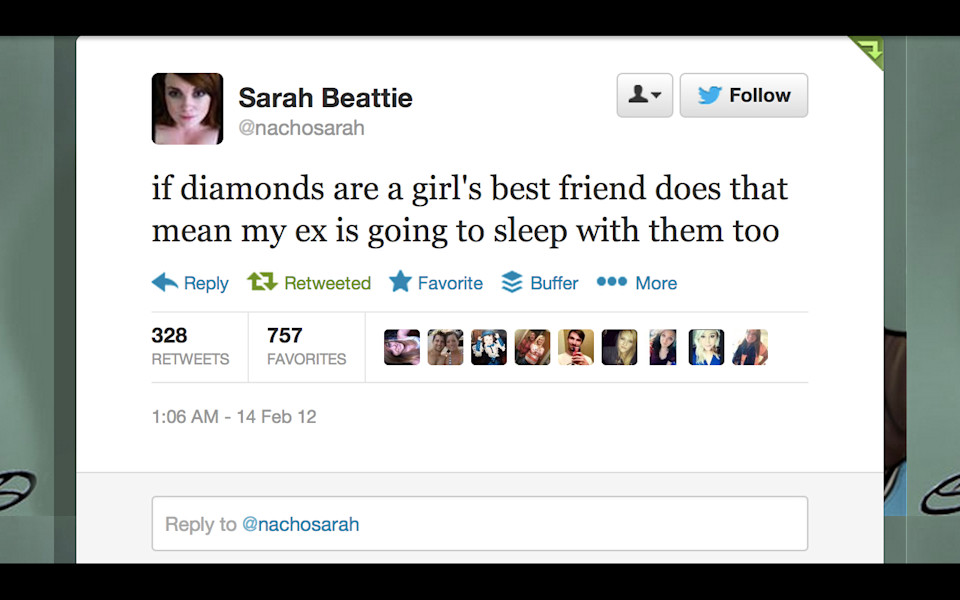
It’s the kind of thing that looks funny when you describe it like this, but it wasn’t funny.
There’s no good way for someone to cheat on their girlfriend with her best friend. But having lived through it I can tell you that there are things that could be done to steer the ship toward more awful or less awful and in this situation it seemed like phasers were clearly set on more awful. And it was one of the most profoundly dehumanizing experiences of my life, to realize that the two people who I loved and trusted and spent the most time with literally didn’t care enough about me, or have enough respect for me at all, to have empathy for what I might be going through, or even to tell me the truth.
-
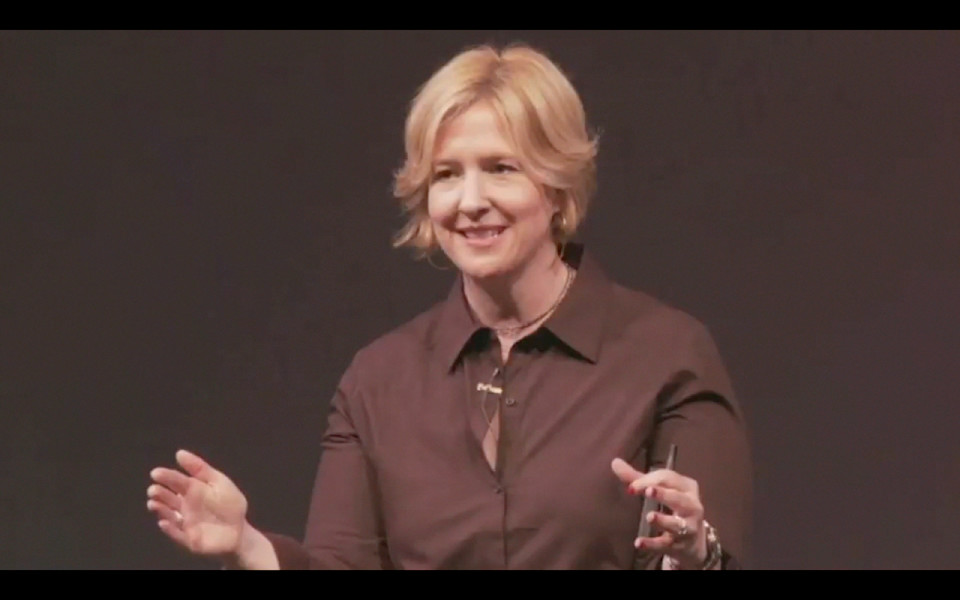
And so as noted vulnerability and shame researcher Brené Brown might say,
Brené Brown: “This led to a little breakdown. Which actually looked more like this. Um, and it did. It led to, I call it a breakdown, my therapist calls it a spiritual awakening. A spiritual awakening sounds better than a breakdown, but I assure you it was a breakdown.”
-
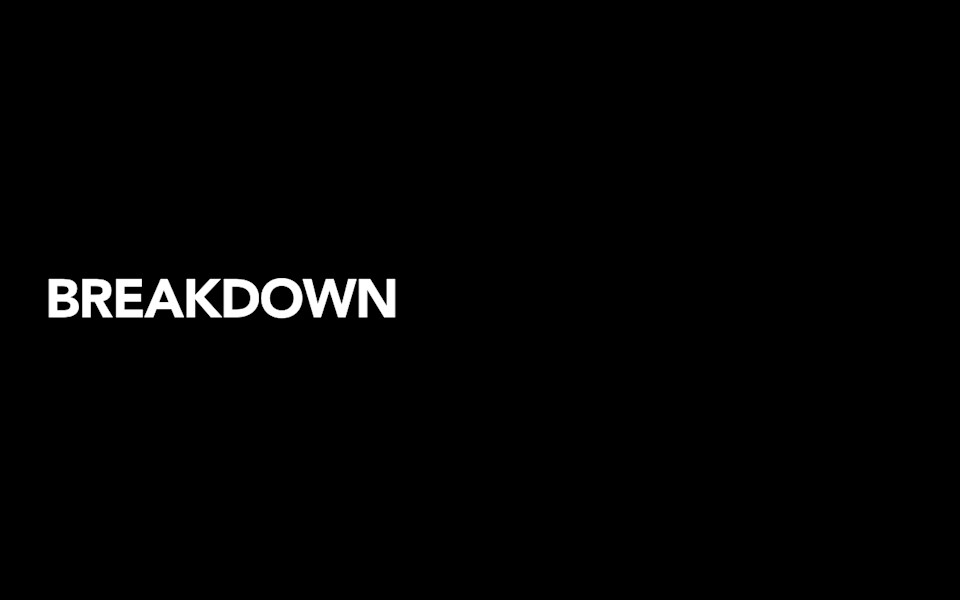
I had a little breakdown. I’m not even going to give you the courtesy of trying to put it into a small font. This was an all caps, full-fledged breakdown.
Brené, as I’m sure you know, she describes her breakdown in this talk as something that emerged from her insights about the intellectual crisis of her research, and what it actually meant to have a life well-lived. I had a completely humiliating breakdown perpetuated by one of like, the oldest stories in the book, the Love Triangle. And, you know, literally, I didn’t do anything for months. I didn’t sleep. I didn’t eat. People had to come over to my house in order to make sure that I was eating. I think that you guys are really going to enjoy my next book called, Heartbreak and Betrayal: The Secrets to Weight Loss. And, you know, standing up here on stage like this, there is no more true statement than the one that is going to come out of my mouth right now. Which is, I really question whether I should talk to you about this. Or, as Brené would say:
-
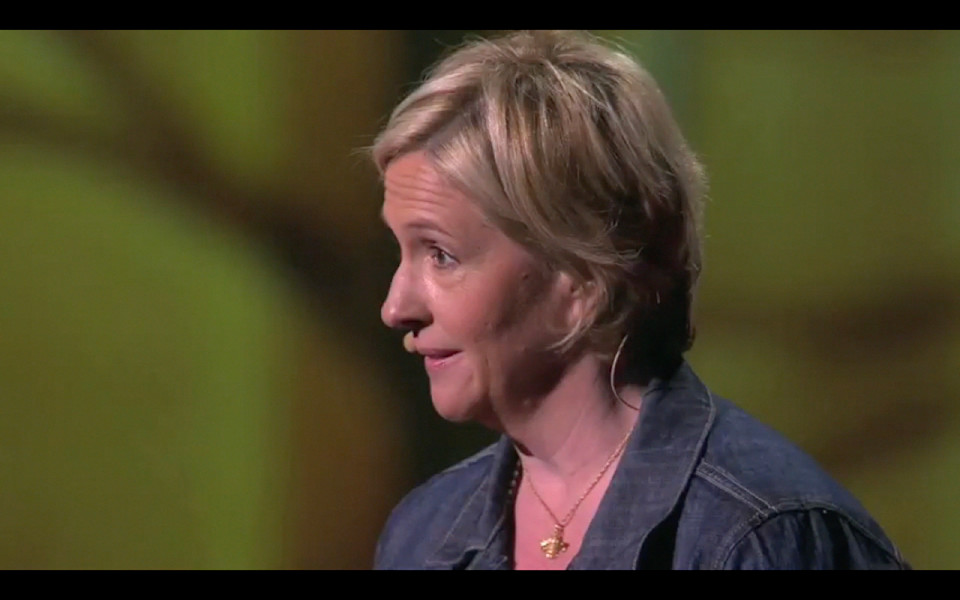
Brené Brown: “I had a slide that said breakdown. At what point did I think that was a good idea?”
-
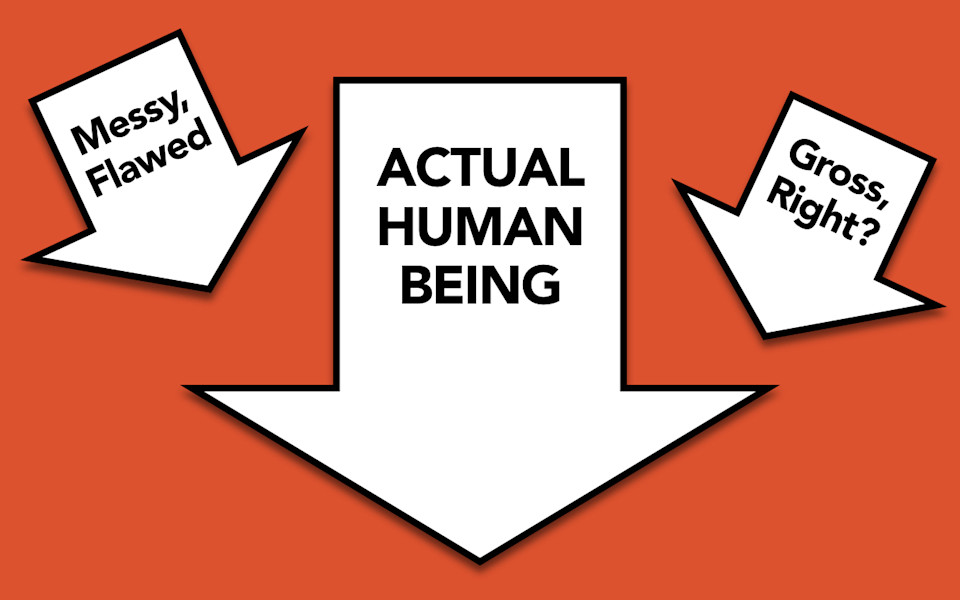
See, this is too personal, right? This is like, too shameful. It’s too humiliating to talk about. I mean, even at an event where people really want you to tell your story, for me to stand up here and acknowledge, yeah, this particularly painful and humiliating thing happened to me. I even sat there looking at my slides last night going “Well, you know, there’s still time to snip this whole center bit out.” Like, I don’t really need to talk about this.
But the thing is for me to stand up here and acknowledge that this happened and how badly it affected me. For me to pretend that this didn’t happen, for me to pretend that everything that I’m talking about in this talk didn’t come as a direct result of having a breakdown, in a sense that’s just getting sucked back into The Loop. It’s just again, me trying to pretend that everything is okay, I have a great facade that makes everything look good and all of these insights that I have are things that I just kind of figured out without having to go through the fire.
And, you know, what it really came down to is that if I didn’t stand up here and admit to this, then you’re going to know that I’m human. I mean, how am I going to keep pretending that I’m better than you if you know that I’m like, an actual human being?
-
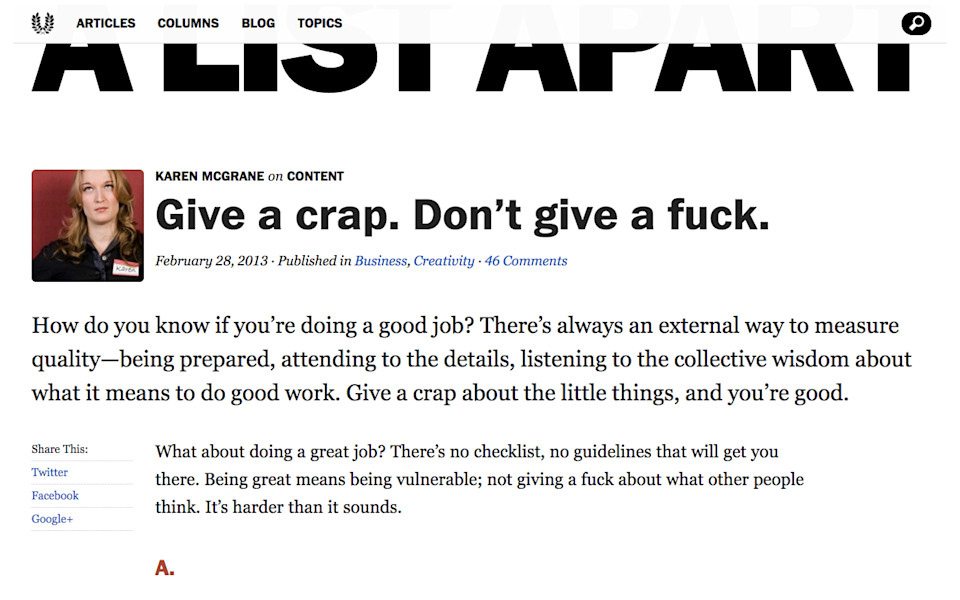
And so I’m actually really proud of everything that has happened to me over the last year, pretty much as a result of this and, you know it’s like, it’s one of these things where I took a look at the situation and I said I have a choice here. This is the kind of thing that could make my life worse or it’s the kind of thing that could make my life better. And I picked better.
And so really everything that I’m here talking about today comes as a direct result of things that I have learned as a result of kind of going through this. I talked a little bit about this last year in a piece that I wrote for A List Apart and the good people there were kind enough to let me publish it.
I talked a little bit about how a personal crisis had really affected my work and how I got pushed to a place where I simply couldn’t judge myself. I simply I had to just stand up and do because I didn’t have the energy to obsess over whether I was good enough. It was essentially like The Loop collapsed around me.
-
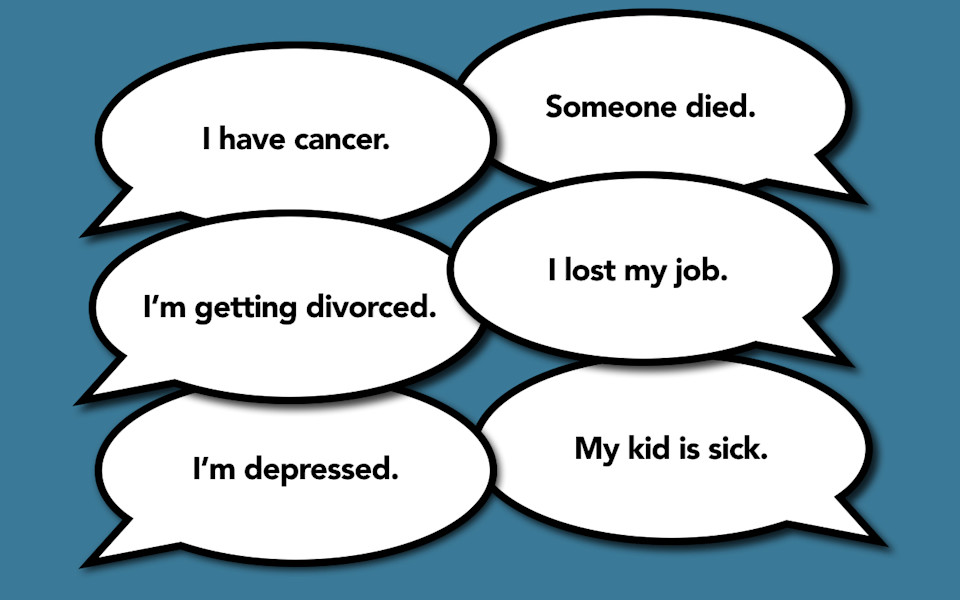
As a result of publishing this, one of the nicest things that has happened to me is how many people then felt like it was okay to reach out to me and talk about their own struggles. Their own crisis. Their own vulnerability. And it all of a sudden, it was like I walked through a door where by being willing to admit to my own struggles and my own vulnerability, somehow I left the Muggles who were trying to pretend that everything was great behind, and I moved into a world where all of a sudden it was okay to talk to me. And so people felt more comfortable sharing what they were going through, thanking me for having the courage to speak up for it.
-
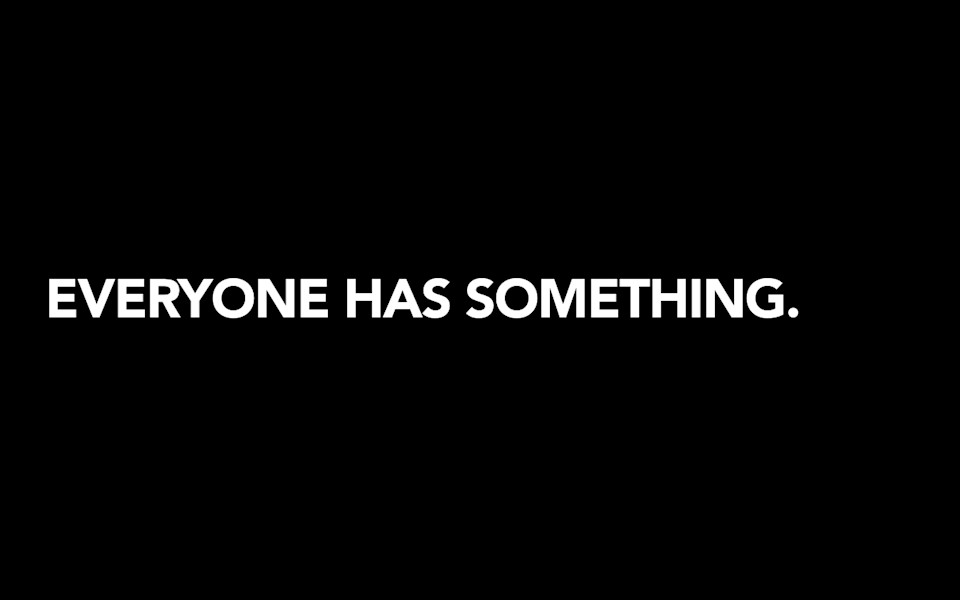
And what really kind of broke my heart was how many people said that they were struggling. And they were afraid to talk about it. They didn’t feel like they could share it. They felt like people would, if people knew that they were going through something like a divorce or an illness that was affecting their work, that they didn’t feel like that was something that they could talk about. And you know what I realized, what comes through so clearly when you start thinking about this, is that everybody’s got something. I mean everyone. We are all just doing the best we can. We are all just kind of trying to hide the fact that we’re struggling.
-
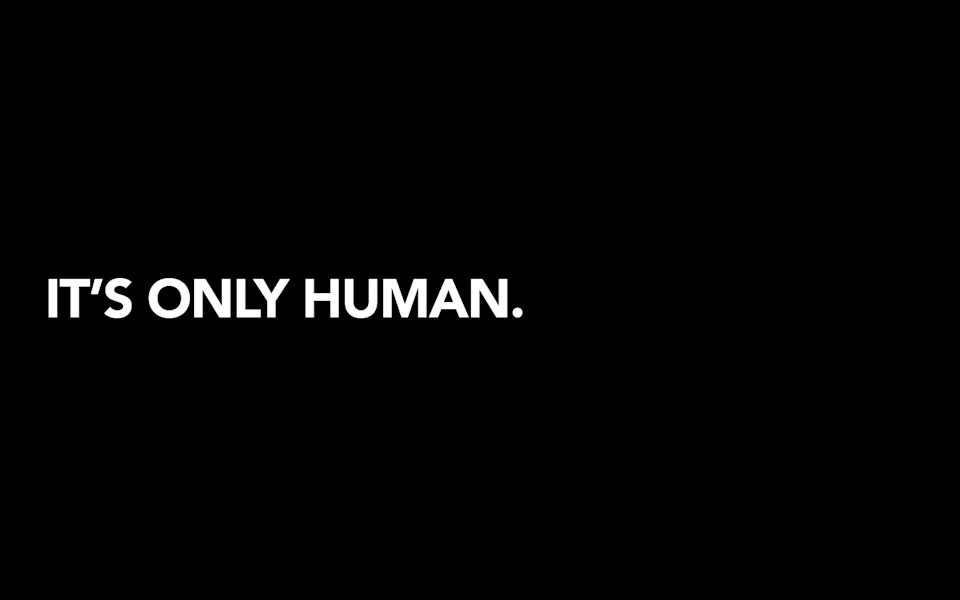
We’re all kind of trying to put out this great-looking highlights reel, but on the inside we all know that we’re not perfect. We have messy lives in which we’re really struggling to keep it together and that, that is what brings us together. Like, it is that experience of acknowledging when things aren’t right, when we feel weak, that’s what makes us human. I mean that’s what you would say to somebody, right? Like if they were, if they’d made a mistake, if something had gone wrong. You know, you’d give them a hug and you’d say, well, that’s only human.
-
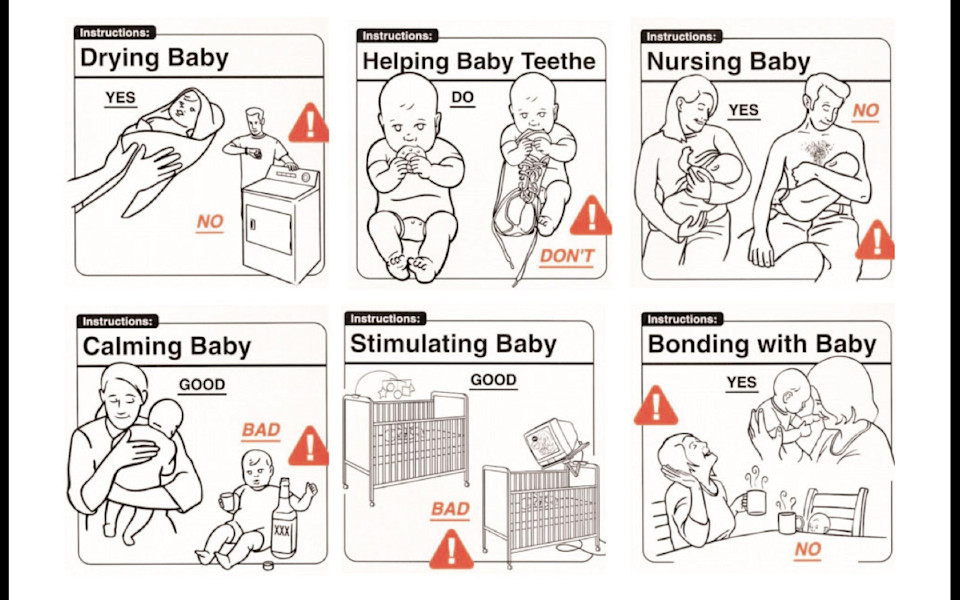
And so that, that willingness to be vulnerable, that willingness to be imperfect, if that is the very thing that actually makes us a part of the broader community, then that’s the compassion that we have to give to ourselves. It is that compassion that you would be willing to extend to a friend or someone in need, that in fact is the exact thing that you have to be willing to give to yourself.
You know, I feel like I so desperately want there to be some kind of manual for what it means to be a human being.
-
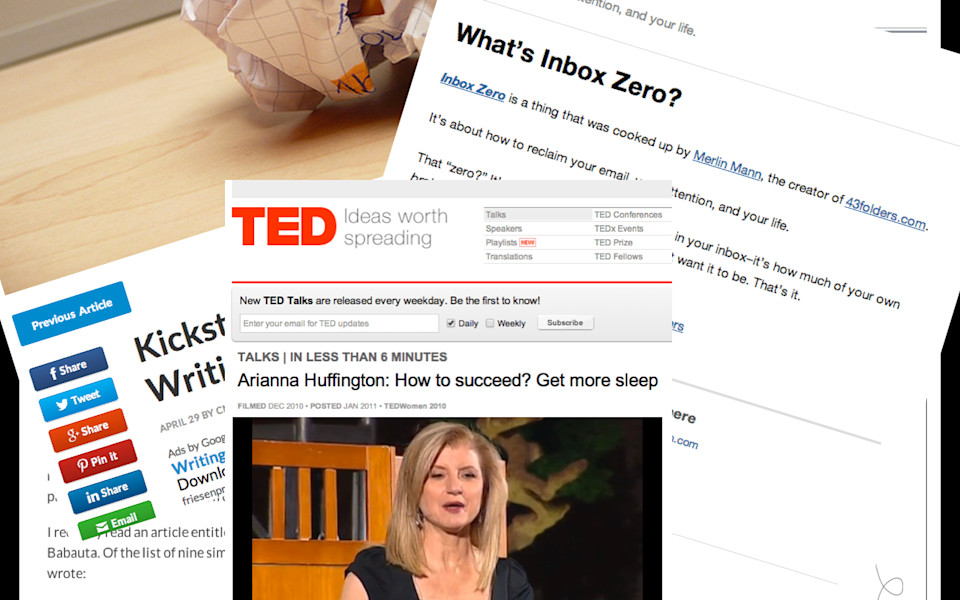
You know, some instructions for, it’s like, well if you just do these things, then you’ll get it right. I can just remember even as a child wanting to look at lists of dos and don’ts to say: Okay well, do it this way and don’t do it that way.
-
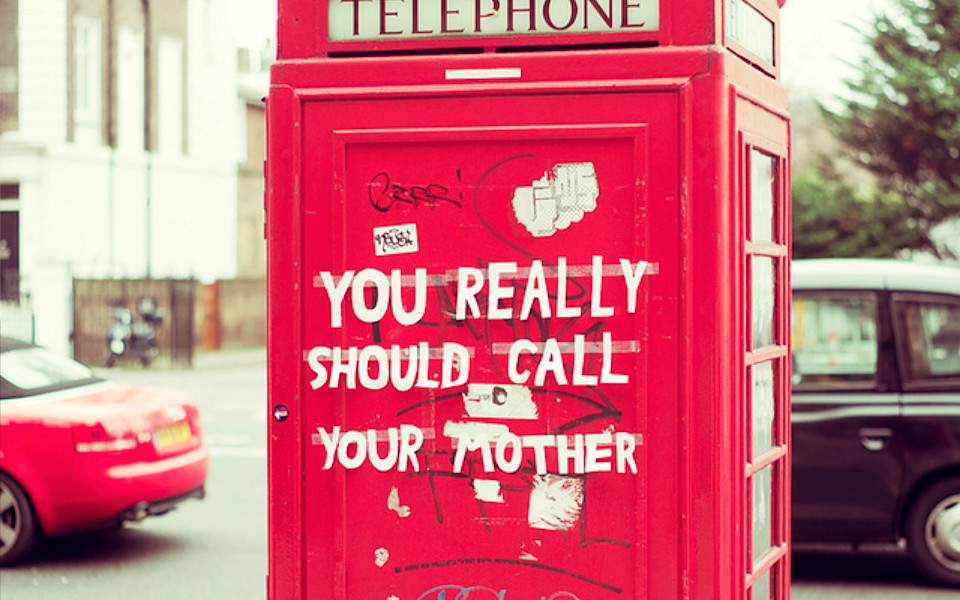
And there is just a never-ending source of life hacks, of instructions about how you’re supposed to wash your bowl out and you know, write 750 words before breakfast. Don’t use your iPhone as an alarm clock and get to inbox zero and you should get more sleep and you should really call your mother.
-
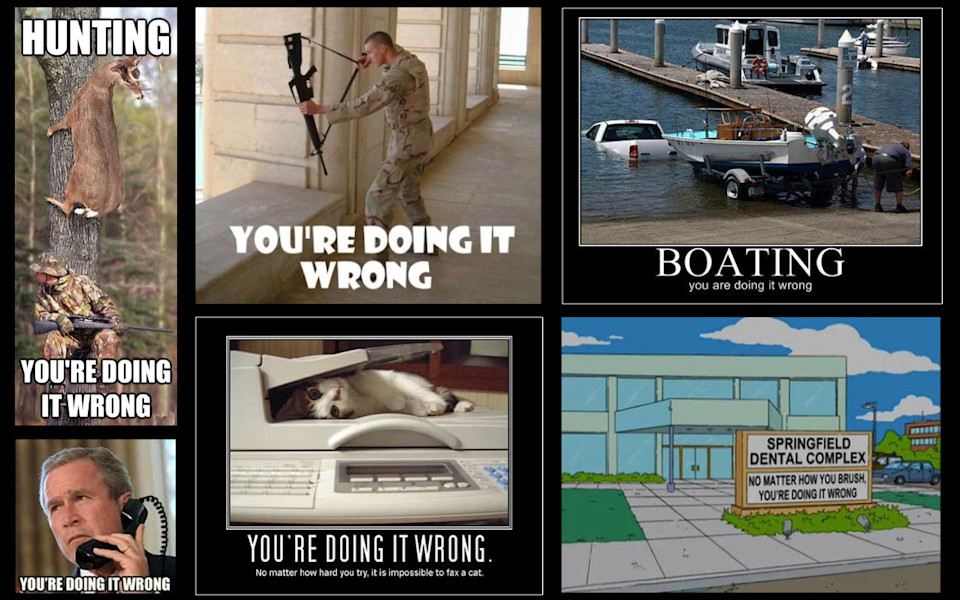
And for all of these instructions about what it takes to do it right, then there’s somebody right there to jump on you, they’re like, no, sorry, you’re doing it wrong.
-
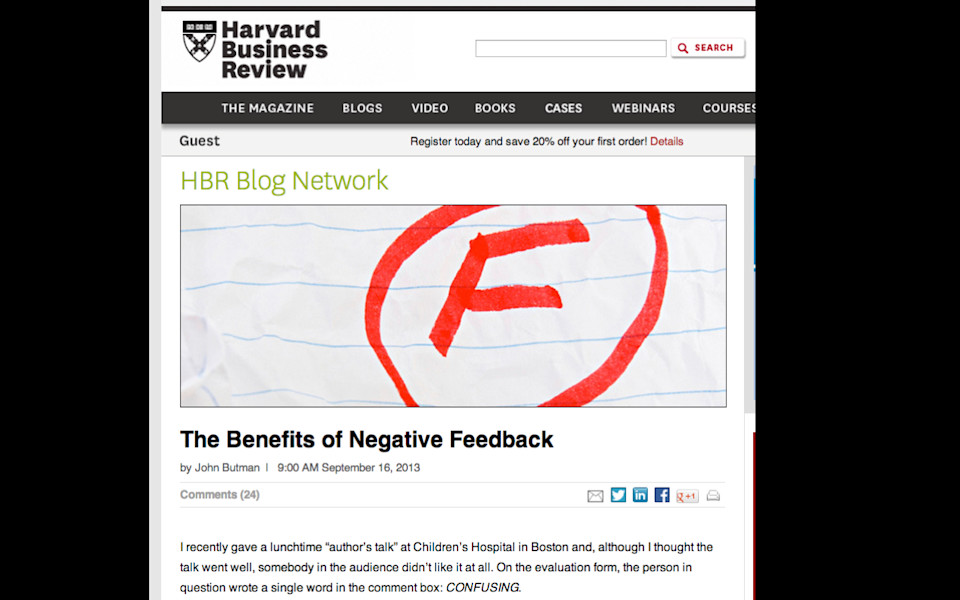
You’re doing it wrong. Could you think of a better meme for our time than someone pointing and laughing at you and being like, “Nah, you’re doing it wrong.” And then on top of that, you know, and for all of our efforts to do it right, for all of the laughing and pointing that we get from people when we’re doing it wrong, then there’s always someone there to say, you know what you’re actually really sucking at is taking feedback. You know, you should actually get really a lot better at taking negative feedback because you know, negative feedback is super important and you know, why aren’t you good at that?
-
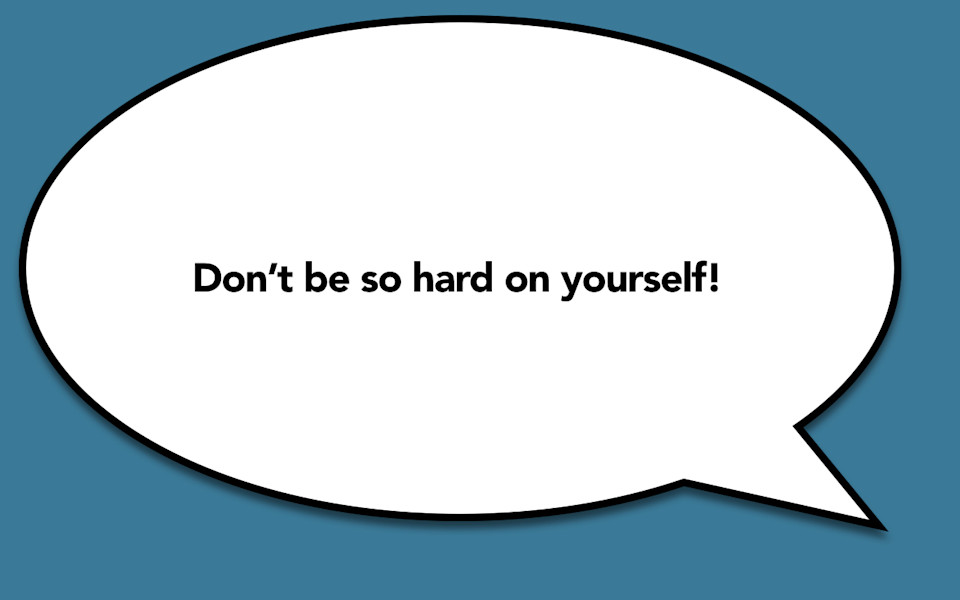
And after all of this we tell ourselves, why are you being so hard on yourself?
-
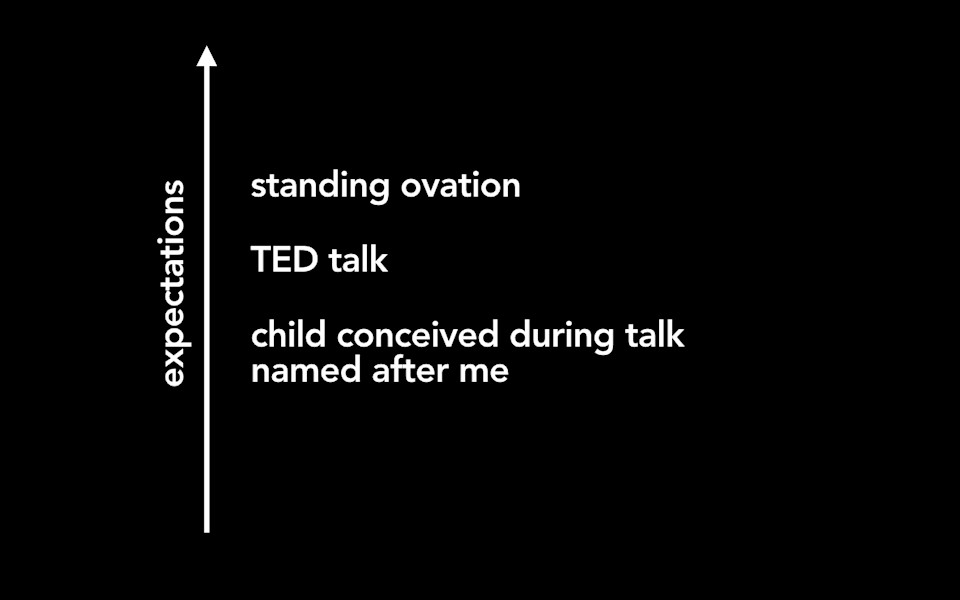
Let me give you an example here of my process for how I write a talk. So when I sit down to write a talk, my expectations are usually, you know they usually start ratcheting up, to where I’m like okay, so, I’m going to get a standing ovation, and then they’re going to turn it into a TED Talk, and a child is going to be conceived during my talk and then they’re going to name it after me.
-
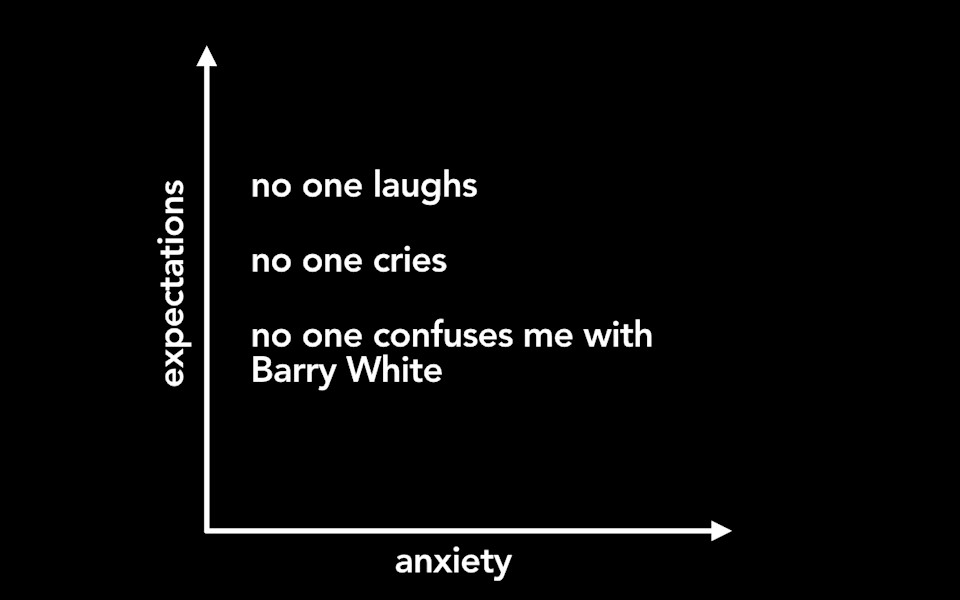
And so, you know I just start getting wound up. But at the same time, all of my anxiety is also getting ratcheted up, where I’m like, okay, but nobody’s going to laugh at the right places, and then they’re going to laugh at the wrong places, and then no one’s going to cry, and then it’s going to become painfully obvious that I’m just no Barry White.
-
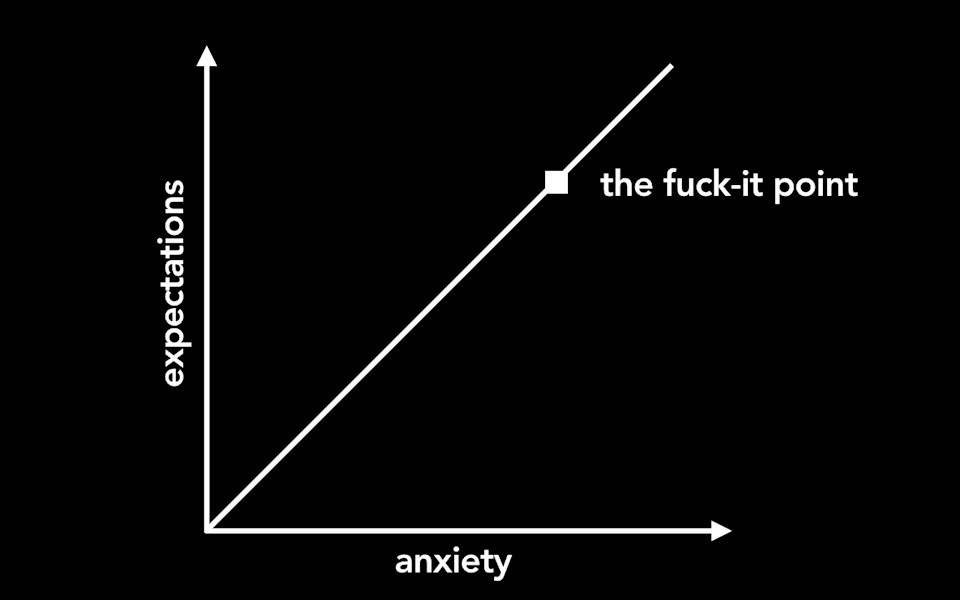
And so, as my expectations and my anxiety like sort of ratchet up in sequence I reach this magical point that I call: The Fuck-It Point.
-
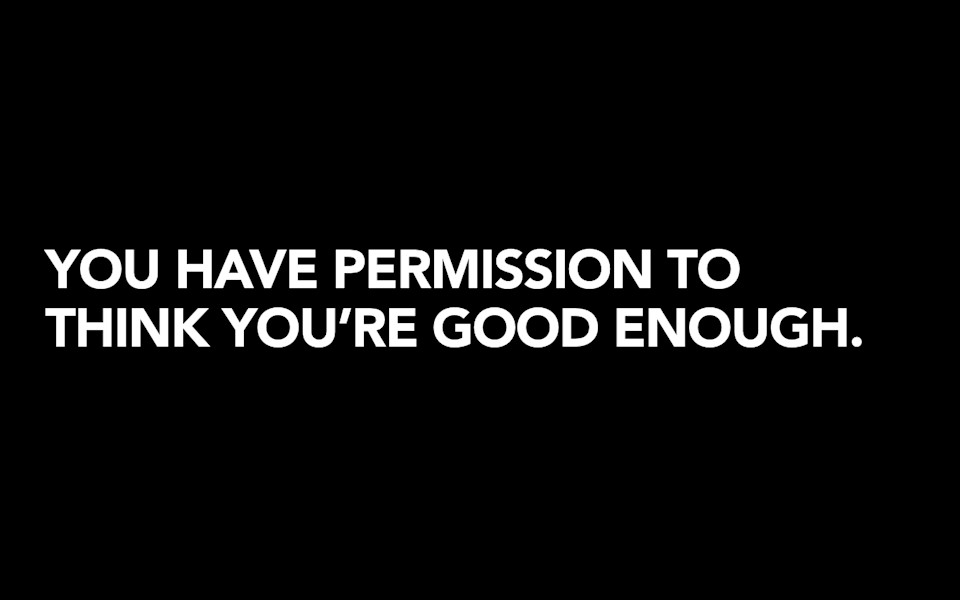
It happens every time I write a talk. I’ve even wanted to explain this in the past where it’s like, okay, what happens at the fuck it point? And it’s literally the point where I put my expectations aside, I ratchet my anxiety back down, and I say, “You know what? This can just be okay.”
I think my career as a motivational speaker is getting off to an excellent start here with my talk called I Suck and So Do You and the theme of Aim for Okay-ness. The thing is, I realized that when I hit the fuck-it point I am not actually aiming for okay-ness. When I hit the fuck-it point, the thing is that I get to the point where I stop focusing on all of this external validation, all of the signs that somebody else is going to give me that the talk is good enough, and I allow myself simply to focus on doing what I do best. Which is writing a good talk. I allow myself to get to the point where it’s like, this just has to be good by my standards. It doesn’t matter if I get a standing ovation at the end of it as long as I let myself think it’s good. You have permission to think that you’re good enough.
-
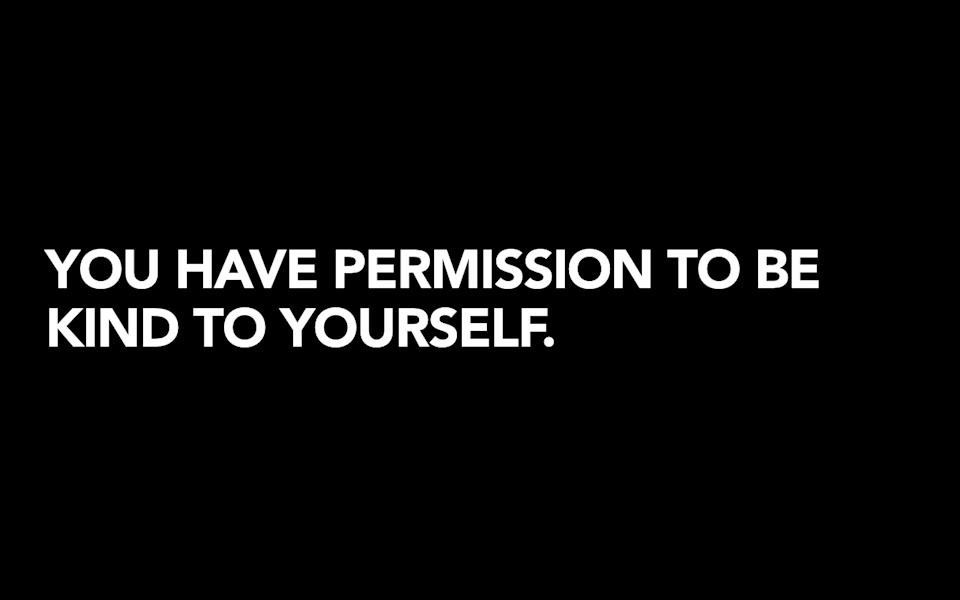
And I think that is the thing that none of us are very good at giving to ourselves. We are never good at allowing ourselves to say, You know what? You’re okay. You’re doing a good enough job. It’s okay if you’re not constantly striving. It’s okay if you’re not constantly telling yourself you’re not good enough. It’s okay if you just let yourself say, “You know what, I actually think I might be pretty good!” You have permission to be kind to yourself.
You have permission to look around and say—the kindness, the friendliness, the compassion, the warmth that I would extend to a friend or a colleague who is struggling, the desire that I would have to try to comfort them or put my arms around them and give them what they need? You can extend that to yourself. And in fact, that right there? That is the only thing that will actually allow you to move past your feelings of judgment and defensiveness and fear and actually get to a place where you can extend that true compassion to other people.
-
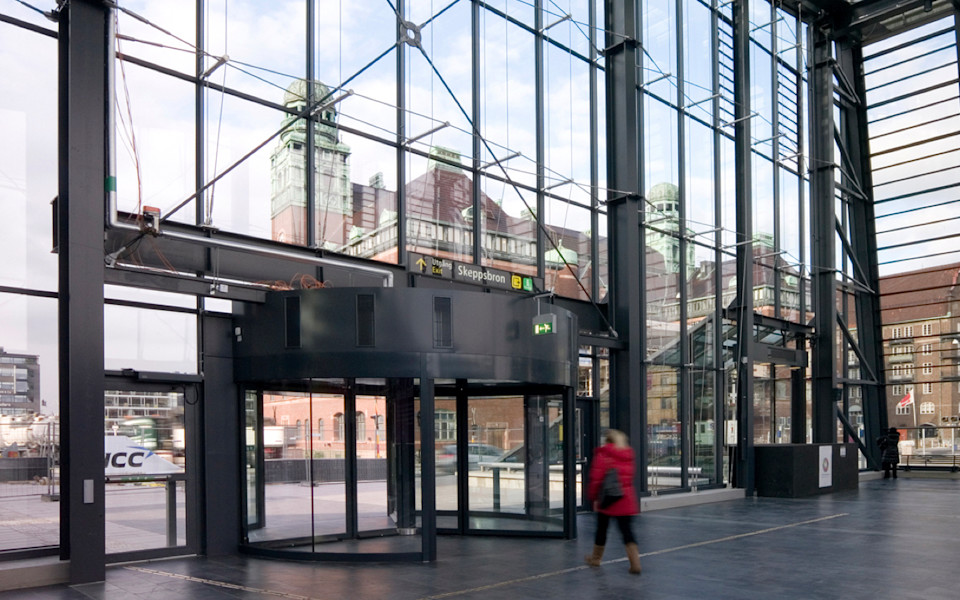
Recently I was in Malmö Sweden and I was going to meet a colleague there, he came over from Copenhagen and he said let’s meet at the train station. So he sent me a text and he’s like, I’ll meet you at the main entrance of the train station.
And I was like, “Great, okay!” Except then I got into the train station and I realized that virtually every door looked the exact same. And so I’m like wandering around the train station, ratcheting up my feelings of anxiety and, and my feeling is basically like “Oh my god, I suck, I’m terrible, like I don’t know where I’m supposed to meet him and I’m going to be late and he’s going to be annoyed with me and he’s going to be angry with me that I wasted his valuable time, he came all the way over here to see me.” And this is The Loop, right?
So it’s like I can’t keep this on myself. So as I’m racing through the train station trying to find the right door I find myself rehearsing this little speech that I’m going to give him. Like, “Well, I didn’t know which door was the main entrance and you should have been more clear about where that was and I’m really sorry but you can’t possibly blame me for this because, you know, really, it was kind of your fault.” And then I just stopped myself and I’m like, “Why would I do that? Why?”
This is kind of a tour of what it’s like inside my brain. Why, why would I do that to him? Why would I do that to myself? He’s not mad at me. He’s not sitting there tapping his foot anxiously wondering why it’s taking me two or three minutes longer to find him in the train station. Why would I set our relationship off on such a negative note by blaming him for something that he’s not even doing?
-
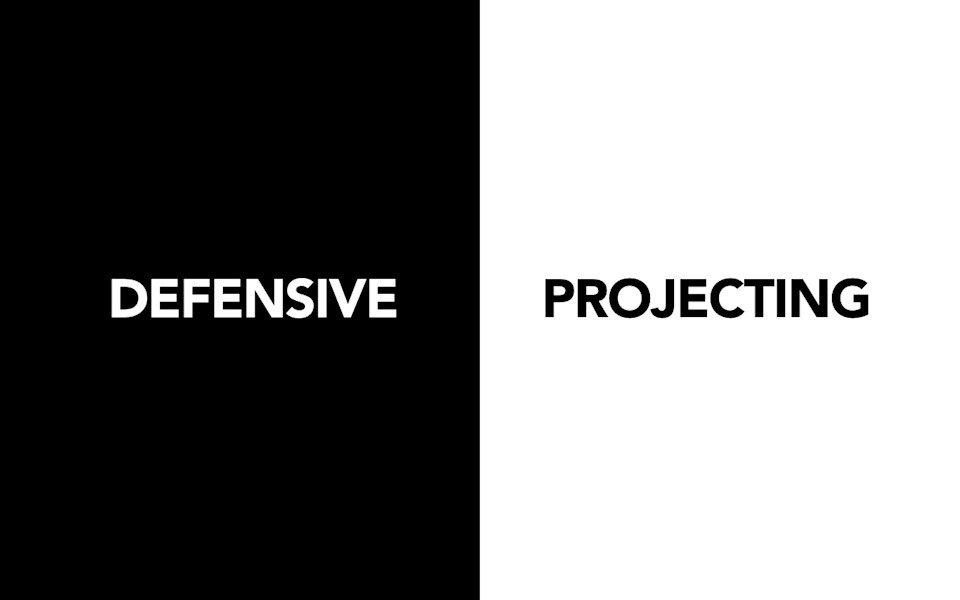
And so it’s like you start to peel that loop back, and realize that the solution here isn’t for me to keep judging myself either. The root of that problem is that I’m beating myself up about: “Oh, I should have done a better job of figuring out where the main entrance was, or I should have asked him to be more clear, or I should have been more clear about where I wanted to meet him.” No! The solution there is that I just start being kinder to myself. I say: “You’re in a foreign city, you don’t know where you’re going, it’s okay to not know. It’s okay.” It’s okay to just acknowledge that maybe you were lost or confused, but you can be nice to yourself about it.
And so, you see this sense that we bring to all of our human relationships—and I guarantee that we bring it to our work—which is that we are defensive, we are fearful, we don’t trust ourselves, we want to be right, but we’re afraid maybe we’re not. We are anxious about our recommendations and you know, you just see people, and they’re getting tense, and so they start projecting.
-
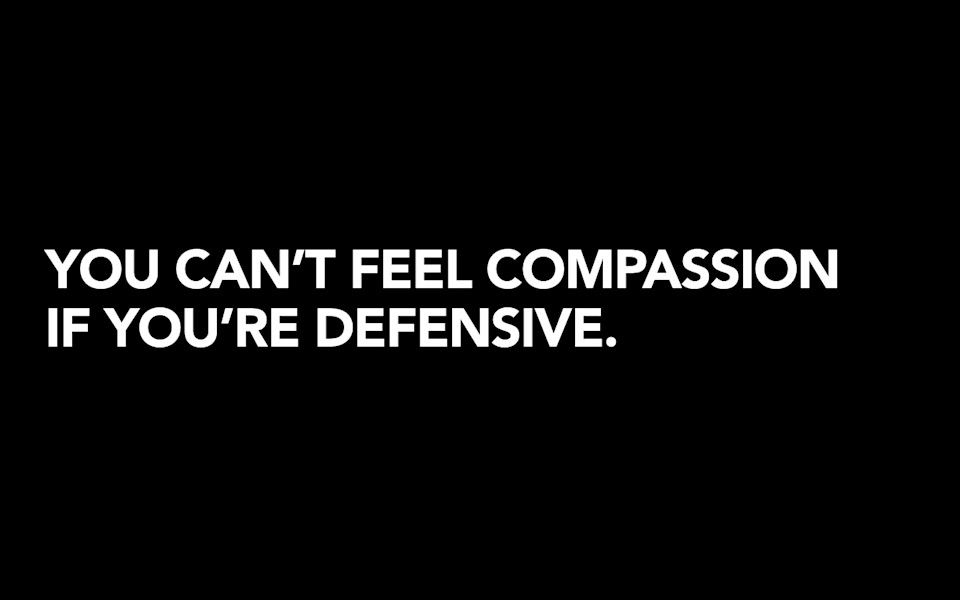
And they start putting that onto other people. They start blaming other people. They start assuming that other people have negative intentions or belief systems that they simply don’t have. And that defensiveness is what actually prevents people from being able to have the compassion that they need to do great work. You can’t feel compassion if you feel defensive.
If your barriers are up, you know? If your hackles are up, if you’re protecting yourself against a slew of imagined insults and a fear-based system of belief, you’re never going to be able to feel the kind of compassion that you need to feel in order to actually see the kind of change that you want to see in the world.
-
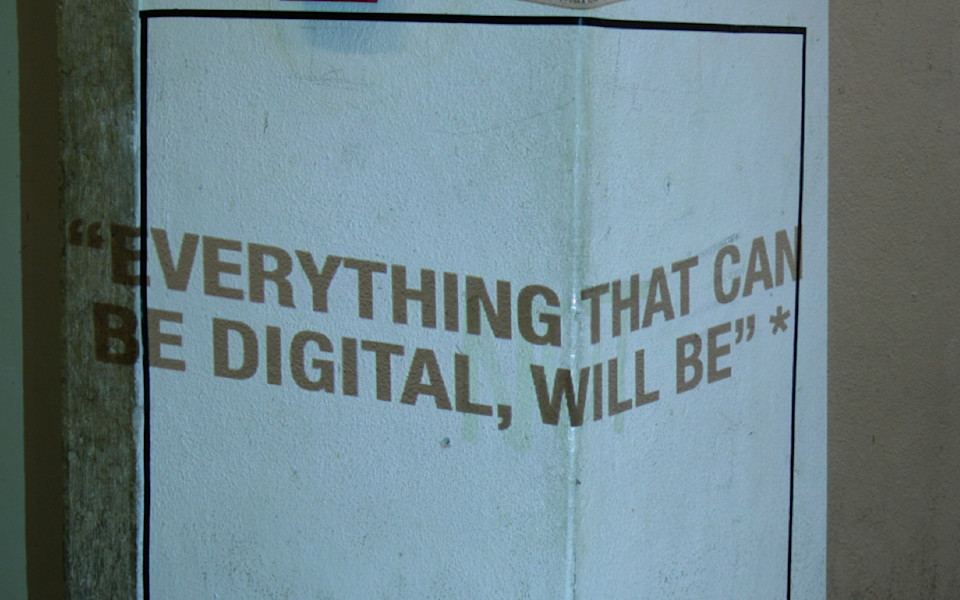
Back when I first started at Razorfish, and they had this tag line which said Everything that can be digital will be which I thought was a beautiful expression of the kind of work that we do and why it’s so important. That yes, right, everything in the world that can be digital eventually will be, and we’re the people who are going to help us get there. So I found that very inspiring.
And this tag line was in support of a positioning that they called Digital Change Management which I thought was a load of crap. It seemed fake and management consulting-y. It’s like, Digital Change Management, what is that? That’s not a thing. We don’t “manage digital change,” we make websites. We make websites. That is our job. We make websites, somebody calls us up, they say we need a website, we build them a website. We try to build them the best website that we possibly can. That is what we do is make websites.
-
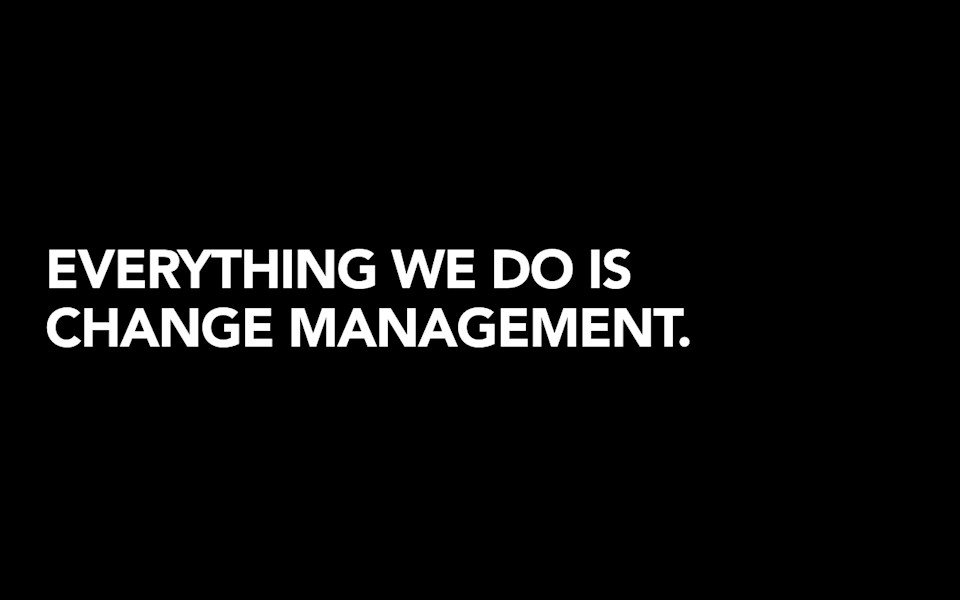
So over the years, as I’ve been doing this, I have come to realize that everything we do is change management.
Everything we do is not about making a website or making a mobile app, or figuring out the content management system, or, you know, any of the other specific, tangible project-based things that we do. I mean those things are important, don’t get me wrong, but the real work that all of us are doing, the hard, difficult work is in helping organizations adapt to digital change. It’s helping these companies figure out how they are going to make decisions differently, how their products are going to change, how their relationships with their customers are going to change, and really how their jobs are going to change.
-
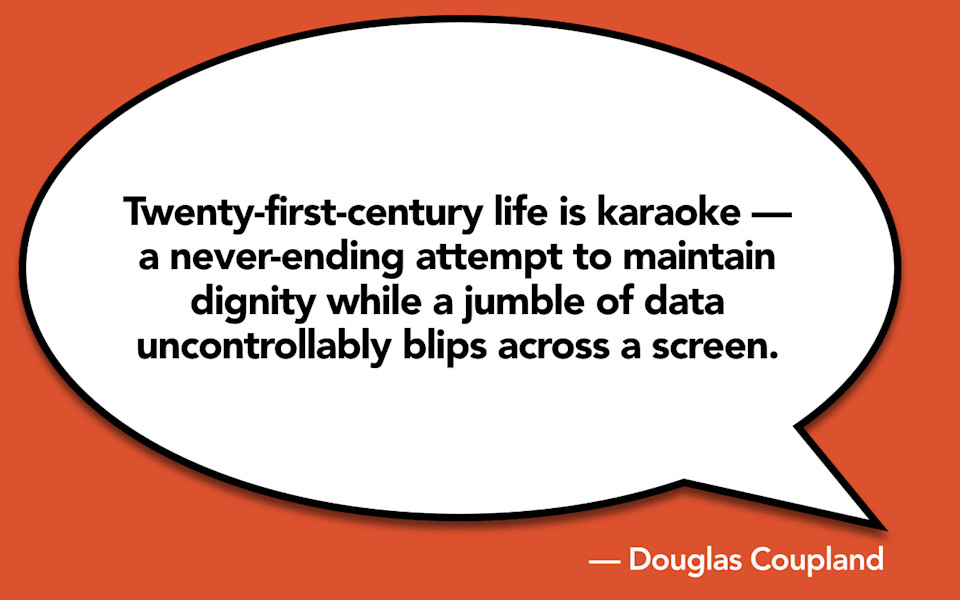
I love this quote from Douglas Coupland. He says, “21st Century life is karaoke. A never-ending attempt to maintain dignity while a jumble of data uncontrollably blips across the screen.”
-
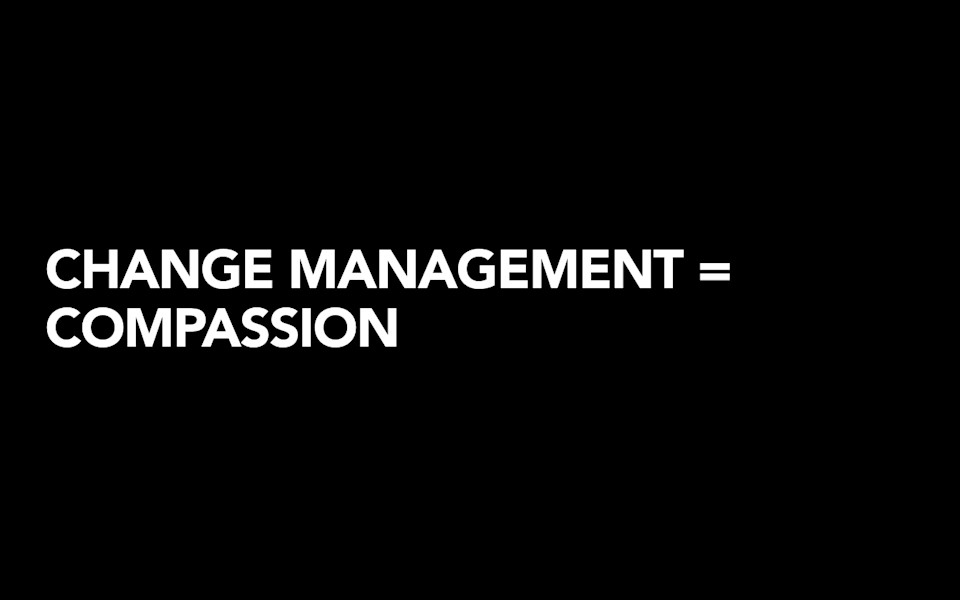
The people that we work with are trying to maintain their dignity. The people that we work with, our clients, our stakeholders, our co-workers. They are sick of the internet. They are sick of the pace of digital change. They are sick of having to make decisions about things that they don’t fully understand. They are sick of having to constantly jump at the next new thing and they are sick of the fact that every time that someone comes in to tell them here’s what’s going on, it’s like: Why haven’t you built a mobile website yet? How come you don’t understand how important this CMS is? Why don’t you get responsive design? We’re judging them because we’re defensive and we’re making them feel stupid rather than helping them actually understand what digital change means.
Change management means having compassion for the people that we work with.
-
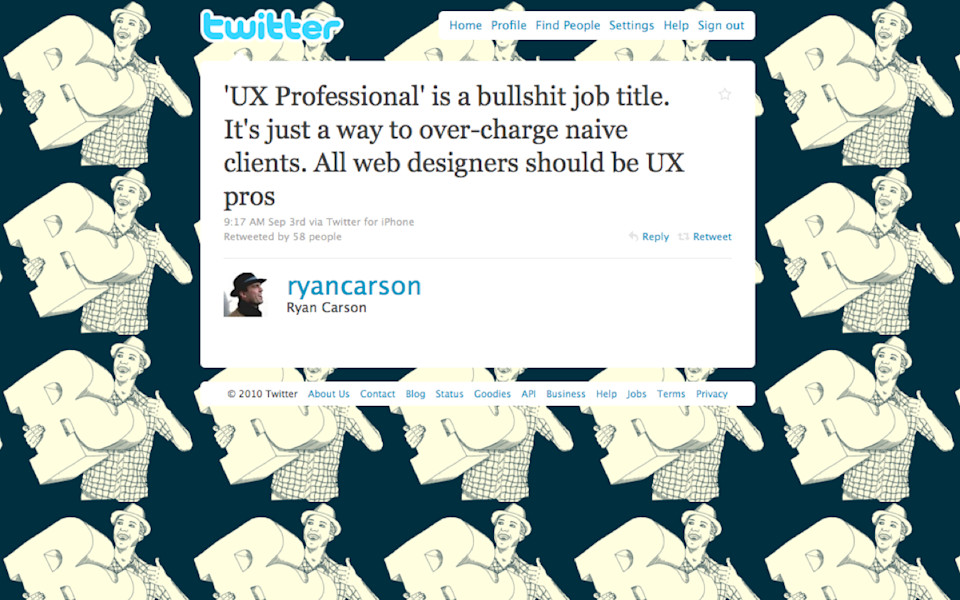
And instead so much of our energy as a discipline is caught up in being defensive. It is caught up in being fearful that we don’t feel valid. That we don’t feel like the work that we do is necessarily worthy. That even amongst our own community, we have people saying, UX is bullshit. It’s not a real job title.
-
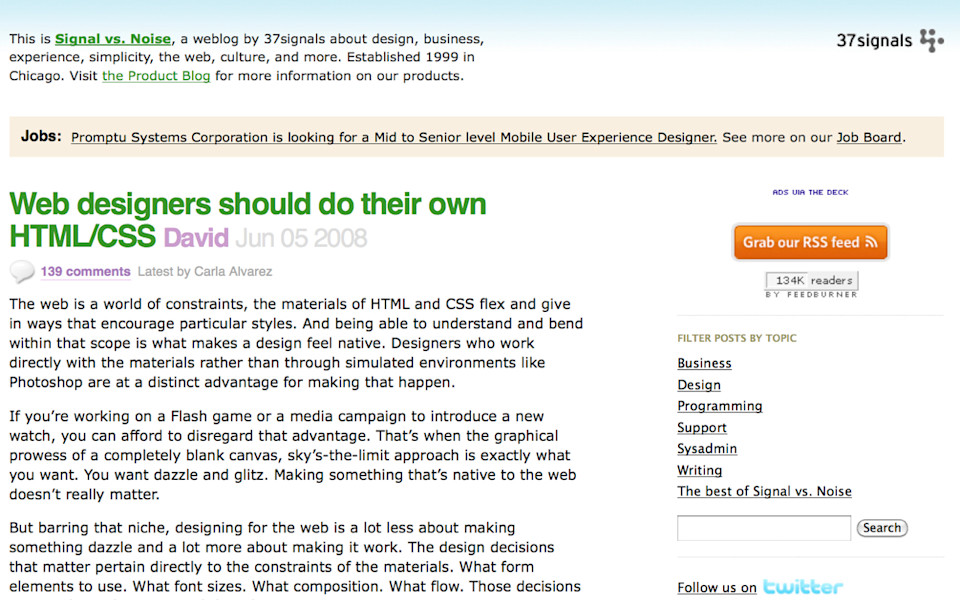
And why do we really need front-end developers? We’ll just have web designers do it.
-
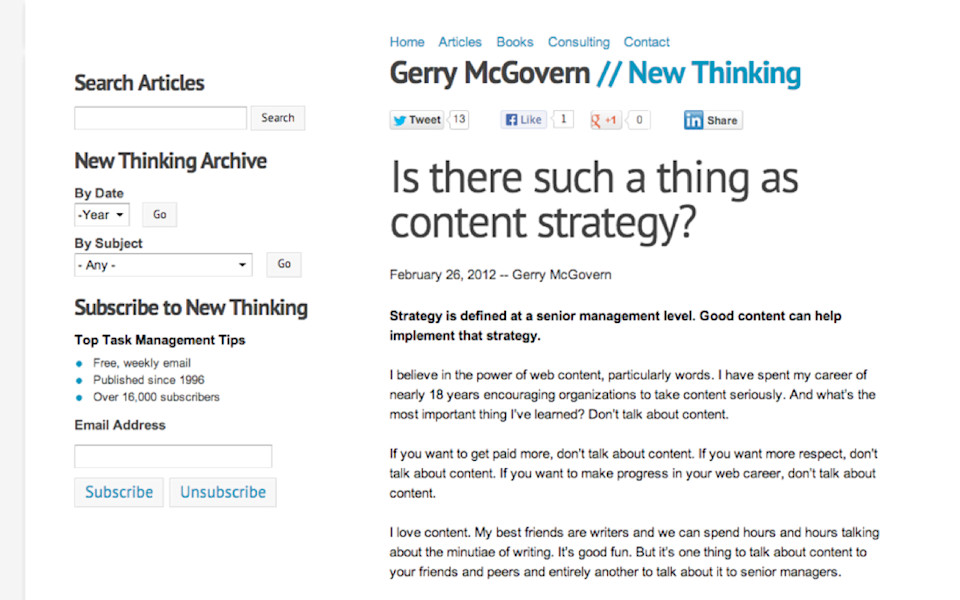
And content strategy? Does that even really exist? I don’t think it does.
And our fear about our own ability to validate our own work comes across then in our defensiveness when we talk to our clients or when we talk to our stakeholders. And we are so caught up in being anxious about whether our own work actually has meaning that we’re forgetting about the fact that our job is to get past our own defensiveness, give ourselves the validation that we need so that we can help guide them through the transitions that they’re going through.
-
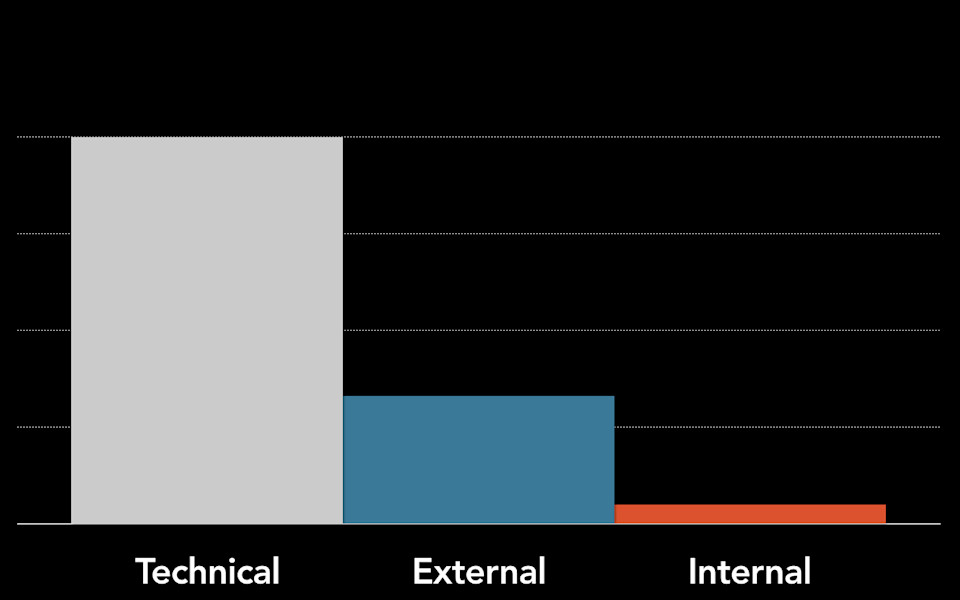
When you look at the kind of skills that people have, I think it’s helpful to divide them into Technical Skills, which are: Are you a good designer? Are you a good developer? Are you a good researcher? External Skills which are: Skills in managing, persuading, coaching, guiding other people. And then Internal Skills which are: Skills essentially in being kind to yourself and helping to validate your own work. Helping to calm yourself down, helping to make you feel good in situations where you might be nervous.
So people who work in the kind of space that we work in, in the design, development, digital space, tend to be very good on the technical skills. They tend to rate themselves very high. It’s like if you’re a developer, yeah, I’m an awesome developer, I’m great at being a developer. And they rank themselves lower on external and internal skills. So you think to yourself: I might, I kind of have some people skills but man, I suck at telling myself I’m doing a good job. I’m terrible at being kind to myself.
And so when faced with a crisis, when faced with a problem, what people do when they don’t know what to do is they go to what they’re good at. So they say, great, I’m an awesome designer and so when I feel afraid, when my ideas aren’t getting traction, when I don’t think that I’m getting the trust or the respect that I need, I’m going to go my technical skills. I’m going to hit those technical skills as hard as possible. I’m going to be right. I’m going to be more right than you. I’m going to explain to you again how my ideas are right and your ideas are wrong and I’m going to be more right than you and my god, you’re going to listen to me because I know what I’m talking about because I am an expert in this technical space. But the problem is, maxing out on your technical skills there isn’t going to solve the problem. Those are exactly the situations where instead of beating your strong suit, you need to build up your weak suit.
-
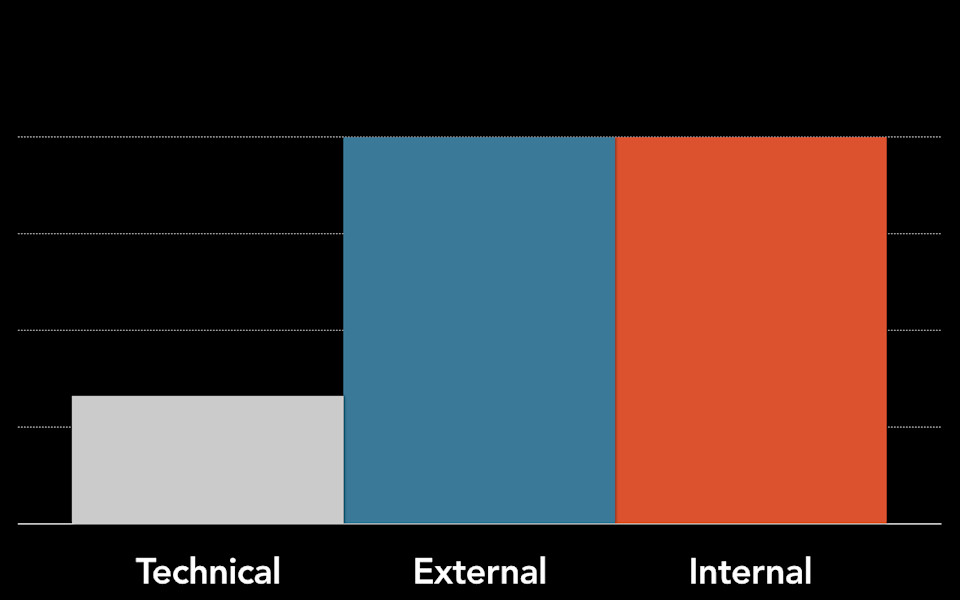
People in these kind of areas they would do much better to do exactly what you guys are doing here, which is focus on building their external skills, managing and persuading and coaching other people. And even more so, working on building their internal skills. Working on building the ability to tell themselves, Hey, you know what? If my ideas aren’t getting traction here, I’m still worthwhile. My ideas are still right. I don’t have to beat somebody over the head with it. Instead I’m going to tell myself that. I’m going to tell myself that I’m right, and then I’m going to figure out how do I coach other people to figure it out.
People who are leaders, people who are executives, people who are sales people, people who are managers tend to rate themselves much more highly on external and internal skills and they tend to rate themselves much lower on technical skills.
And it makes sense, right? I mean, you would think: What’s going to make me a great CEO? Is it being the best designer in the world? Is it being the best developer in the world? What’s going to make me the fantastic salesperson? Is maxing out my technical capabilities? No. In fact these people, they know they’re not the best at what they do. They know they’re not the best writer in the world, but it’s okay, because they’ve chosen to invest more in other dimensions. They’ve chosen to say: Hey, if I spend more time building my external skills and if I spend more time building my internal skills, I’m going to have a greater effect on the world.
And so, so often these kind of things, they get derided as being “soft skills.” I think particularly to somebody who’s focused on their technical capabilities, it’s easy to sort of, pooh-pooh that stuff and be like: Ah, that’s just that hand-wavy, fluffy, namby-pamby soft skills kind of thing. They’re not. They are in fact the most important skills that people can build.
-
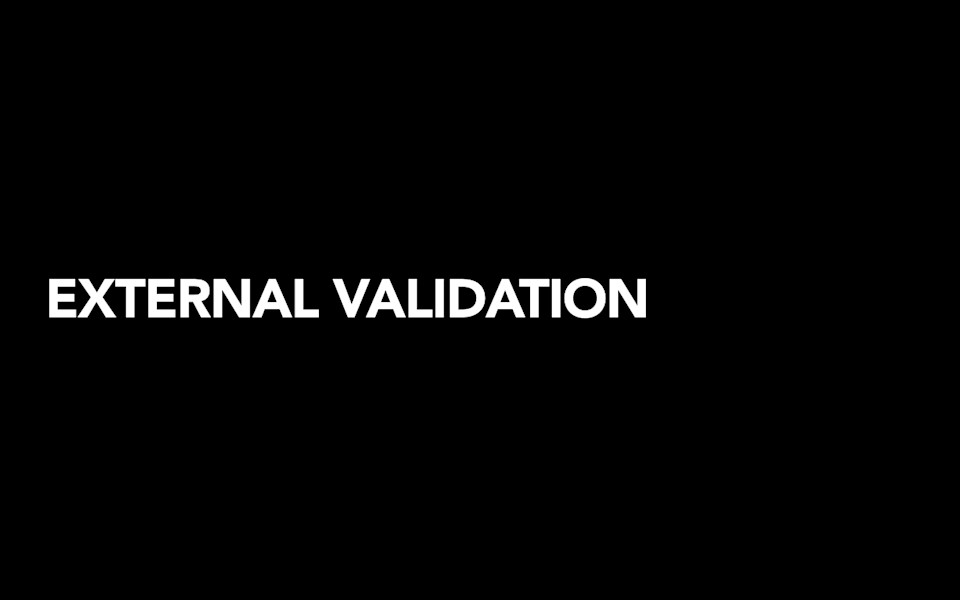
And so, when looking at the kind of things that you all are here to learn how to do and to give yourselves, I want to caution against saying the point of this, the point of standing up here, sharing our stories, writing the confessional blog posts, talking about the fact that: yes we all feel vulnerable, yes we all feel shame. The point isn’t for us to take our shame and run around with it like a cape and show everybody, like, “Look! Shame! We all have it!” The point of it isn’t to look around and try to find that kind of external validation from the people here.
-
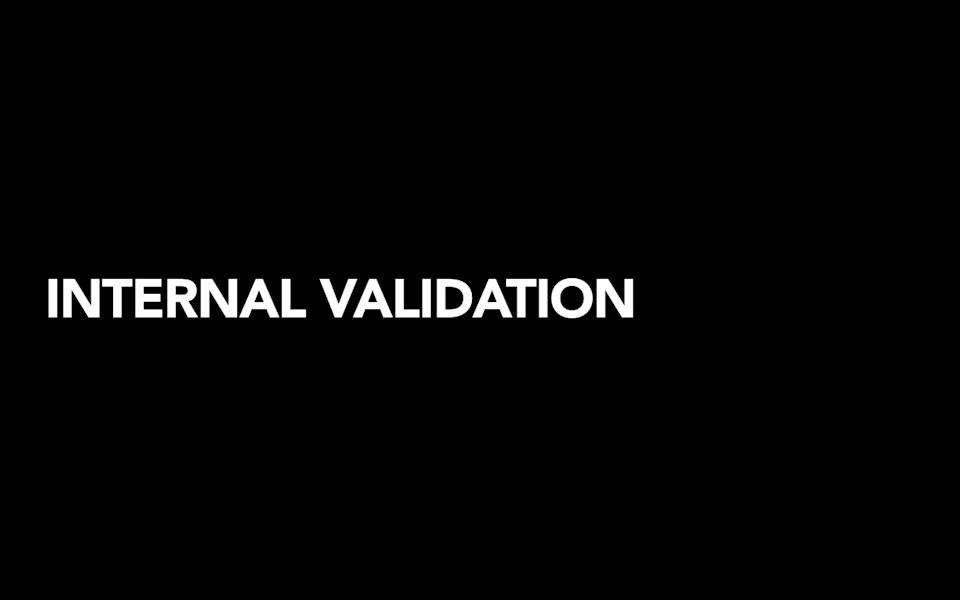
All that is, is The Loop, okay? All that is is getting back into a sense that: I am looking for other people to validate me. I want my shame validated and I want everybody to clap me on the back saying: Oh it’s great that you feel vulnerable. The point of this isn’t to get external validation for that. The point of this, the point of being here, of talking to other people, of sharing these kind of stories and hearing other people share these stories is for you to recognize that you’re not alone. It’s for you to build your skills in giving yourself that kind of internal validation.
It’s for you to recognize that it is okay for you to give yourself the same love and compassion that you would want extended to anybody here, and to recognize that it is only through giving yourself that kind of support and that caring that you will be able to give it to the people who need it the most, who are your friends, your colleagues, your co-workers, your loved ones, anybody who is struggling with the change of human life.
-
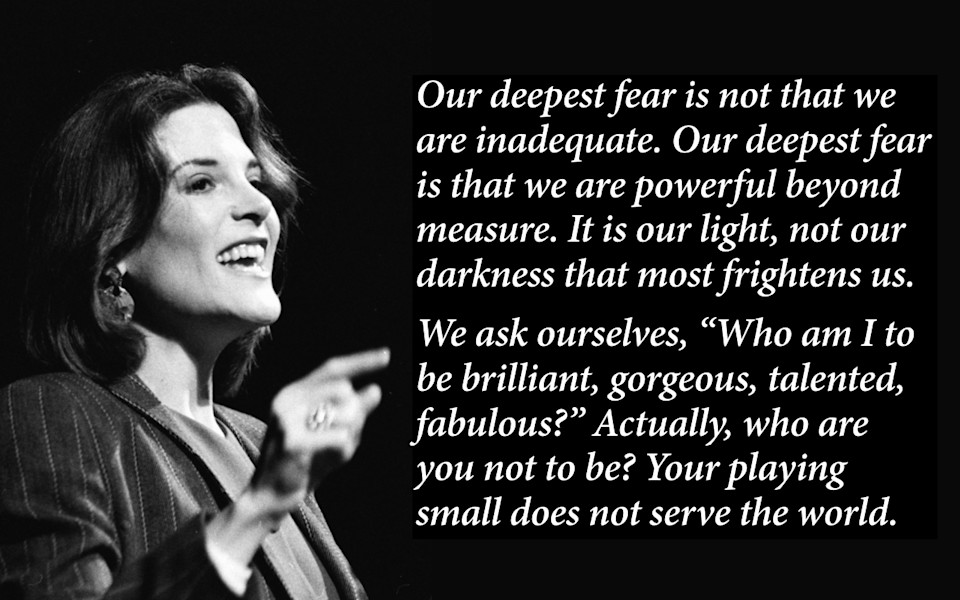
Let me leave you with this, it’s a quote from [former candidate for the presidency of the United States of America] Marianne Williamson, she says,
Our deepest fear is not that we are inadequate. Our deepest fear is that we are powerful beyond measure. It is our light, not our darkness that most frightens us. We ask ourselves who am I to be brilliant, gorgeous, talented, fabulous? Actually, who are you not to be? Your playing small does not serve the world.
-
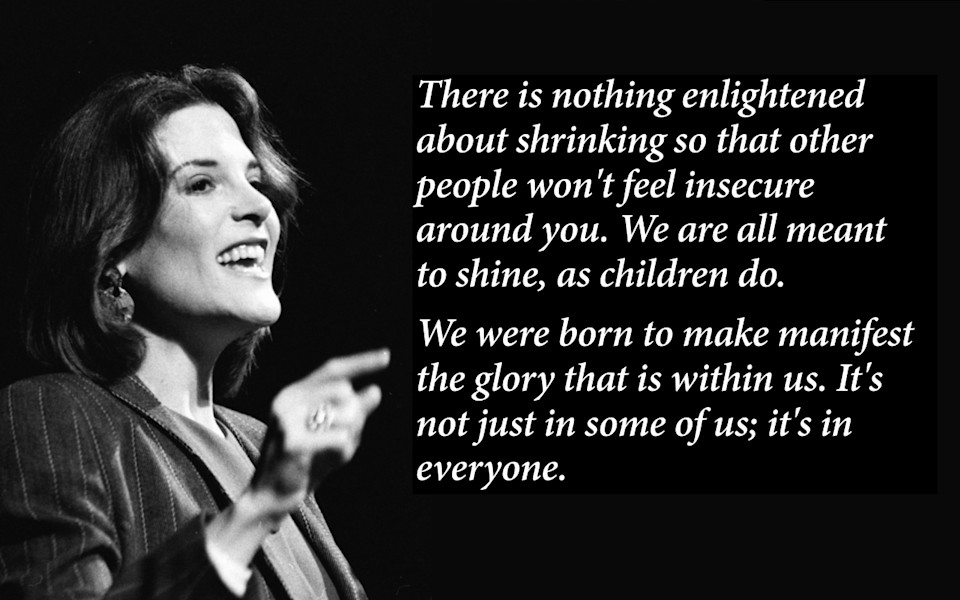
There is nothing enlightened about you shrinking so that other people won’t feel insecure around you. We are all meant to shine like children do. We were born to make manifest the glory that is within us. It’s not just in some of us, it’s in everyone. And as we let our own light shine we unconsciously give other people permission to do the same. As we are liberated from our own fear, our presence automatically liberates others.
-
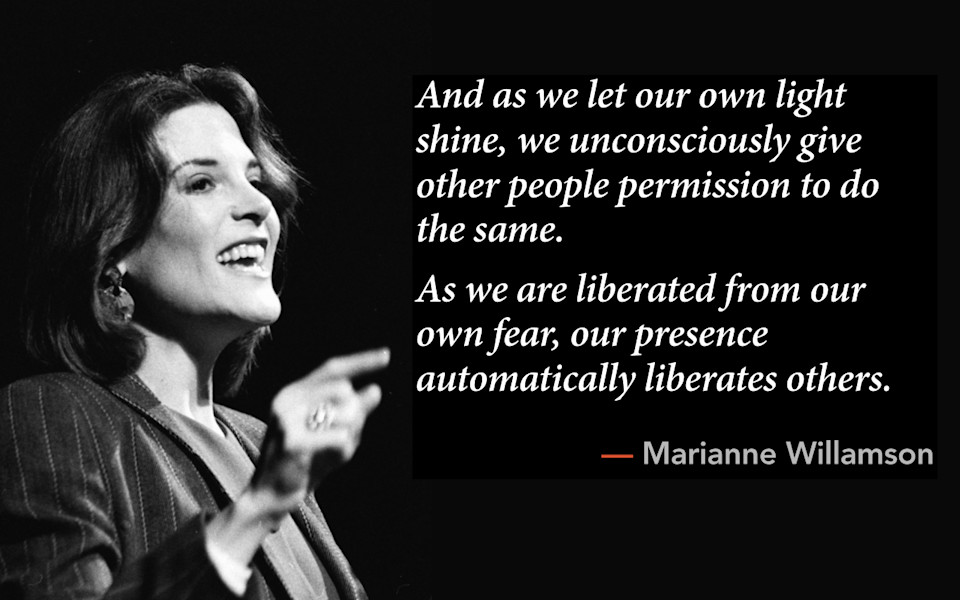
And as we let our own light shine, we unconsciously give other people permission to do the same. As we are liberated from our own fear, our presence automatically liberates others.
-
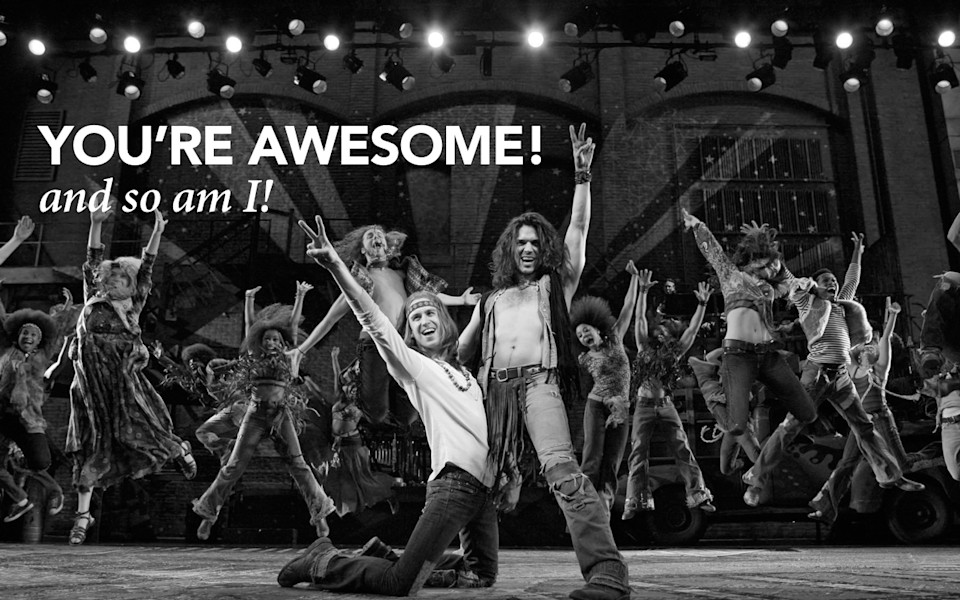
So I hope that you, here, over the next couple of days will understand that it is your right and your responsibility to shine. You guys are awesome. Thank you.
-
